Kentucky Documents
Quitclaim Deed
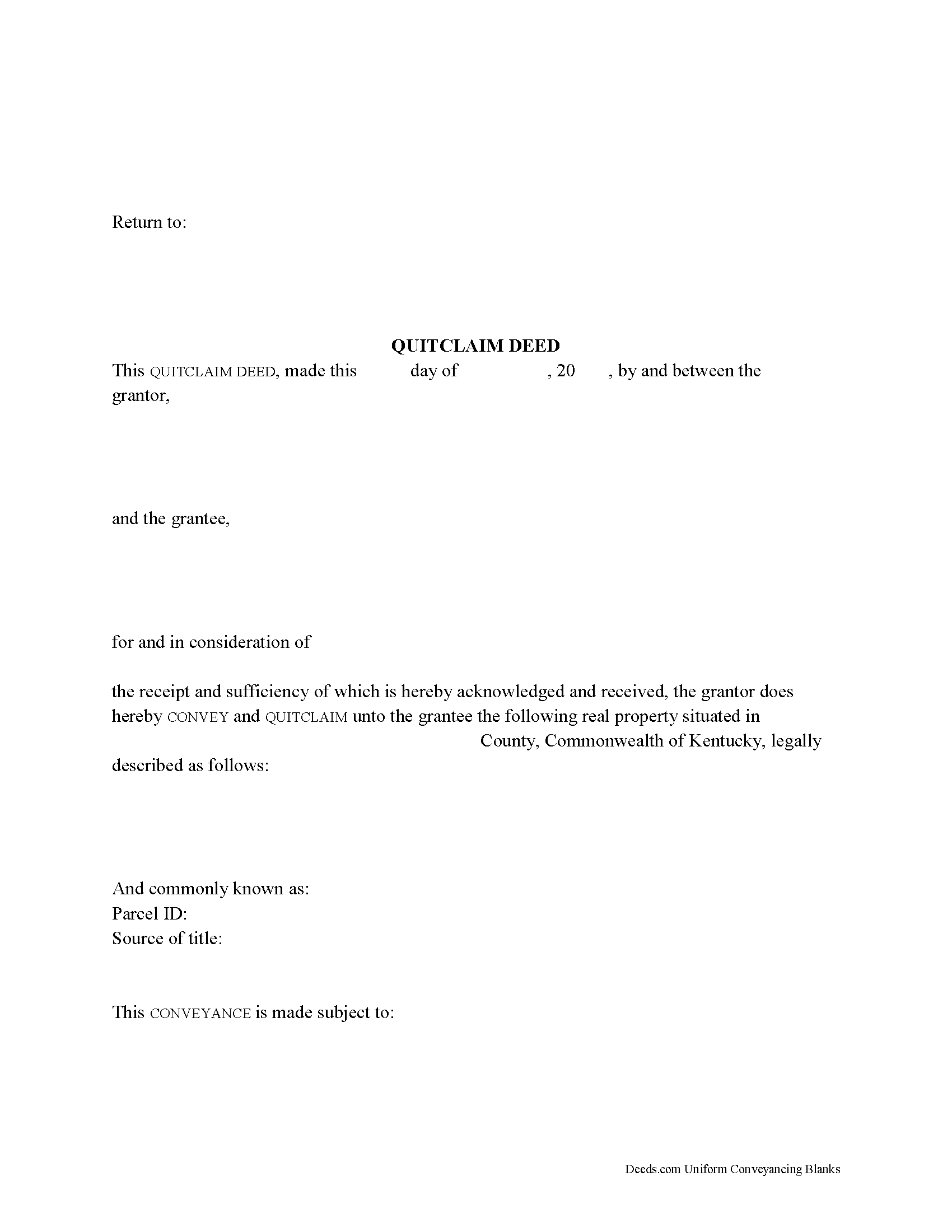
Real property transfers are governed by Chapter 382 of the Kentucky Revised Statutes.
Although they are not defined in the statutes, Kentucky accepts quitclaim deeds to transfer the rights, title, and interest in real estate, if any, from the grantor (seller) to the grantee buyer), with no protections for the grantee. There may be potential unknown claims or restrictions on the title, and the buyer accepts the risk that the grantor may not have complete ownership of the property. Because of this, quitclaim deeds are commonly used to clear title, for transfers between family members, or in other situations where warranties are not necessary.
A lawful quitclaim deed identifies the names and addresses of each grantor and grantee. Kentucky law requires all recorded documents or documents affecting a change in property ownership to contain information on how the grantee will hold title (vesting). For residential property, the primary methods for holding title in co-ownership are tenancy in common, joint tenancy, and tenancy by entirety. A grant of real estate to two or more persons creates a tenancy in common, unless otherwise specified. Tenancy by entirety is available to married... More Information about the Kentucky Quitclaim Deed
Gift Deed
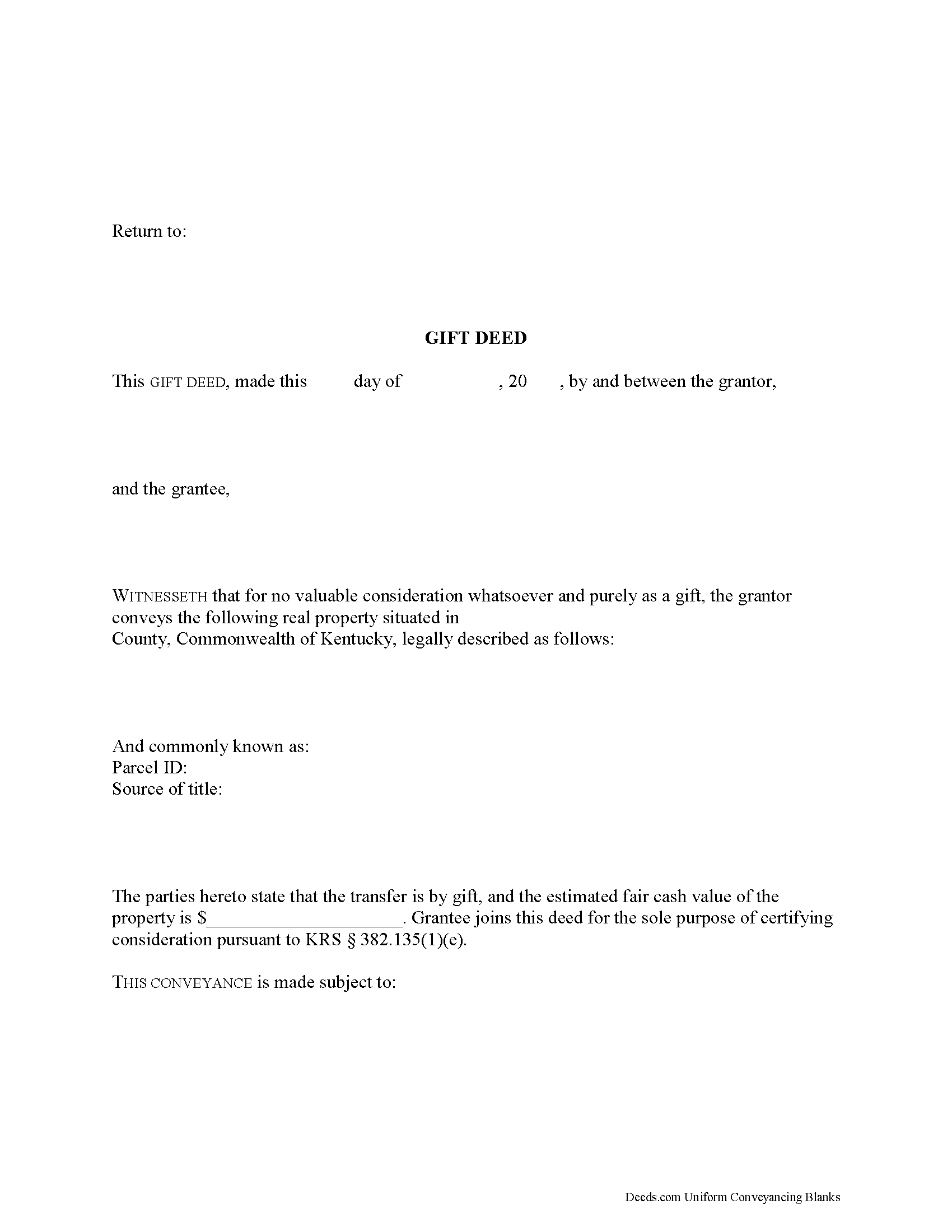
Gift deeds convey title to real property from one party to another with no exchange of consideration, monetary or otherwise. Often used to transfer property between family members or to gift property as a charitable act or donation, these conveyances occur during the grantor's lifetime. Gift deeds must contain language that explicitly states that no consideration is expected or required. Ambiguous language, or references to any type of consideration, can make the gift deed contestable in court.
A lawful gift deed includes the grantor's full name and marital status, as well as the grantee's full name, marital status, vesting information, and mailing address. Vesting describes how the grantee holds title to the property. Generally, real property is owned in either sole ownership or co-ownership. For Kentucky residential property, the primary methods for holding title are tenancy in common, joint tenancy, and tenancy by the entirety. An estate conveyed to two or more persons is considered a tenancy in common, unless a joint tenancy is specified. An estate conveyed to a husband and wife vests as a tenancy in common, unless a tenancy by the entirety with full right of survivorship is... More Information about the Kentucky Gift Deed
Warranty Deed
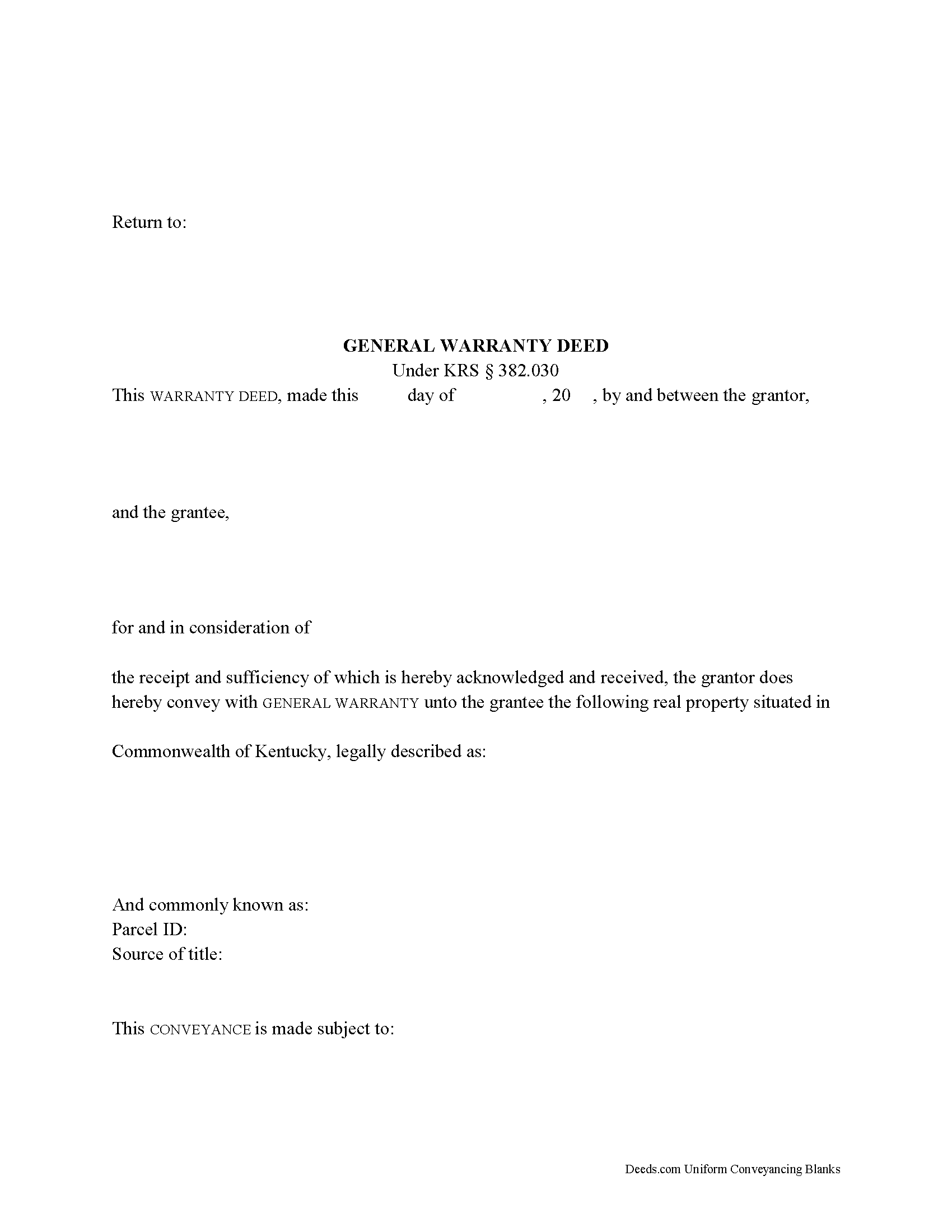
General warranty deeds are statutory conveyances under KRS 382.030. The deed must state that the grantor "will warrant the property hereby conveyed" or contain words of import like "with warranty" or "with general warranty" (KRS 382.030).
A warranty deed is a legal instrument used to transfer, or convey, rights in real property from a grantor (seller) to a grantee (buyer). They offer substantial protections for the grantee and are the most common type of deed for standard real estate transactions. When using a general warranty deed, the grantor warrants that they are the true owner of the property and have the legal right to convey it, that the property is free of liens or encumbrances unless otherwise listed in the deed, and that the grantor will defend the grantee's right to the property if anyone makes a claim against the title, forever.
In addition to meeting all state and local standards for recorded documents, a lawful general warranty deed identifies the grantor and grantee and their addresses. State law requires information on how the grantee will vest title in the property. For Kentucky residential property, the primary methods for holding title in co-ownership are... More Information about the Kentucky Warranty Deed
Special Warranty Deed
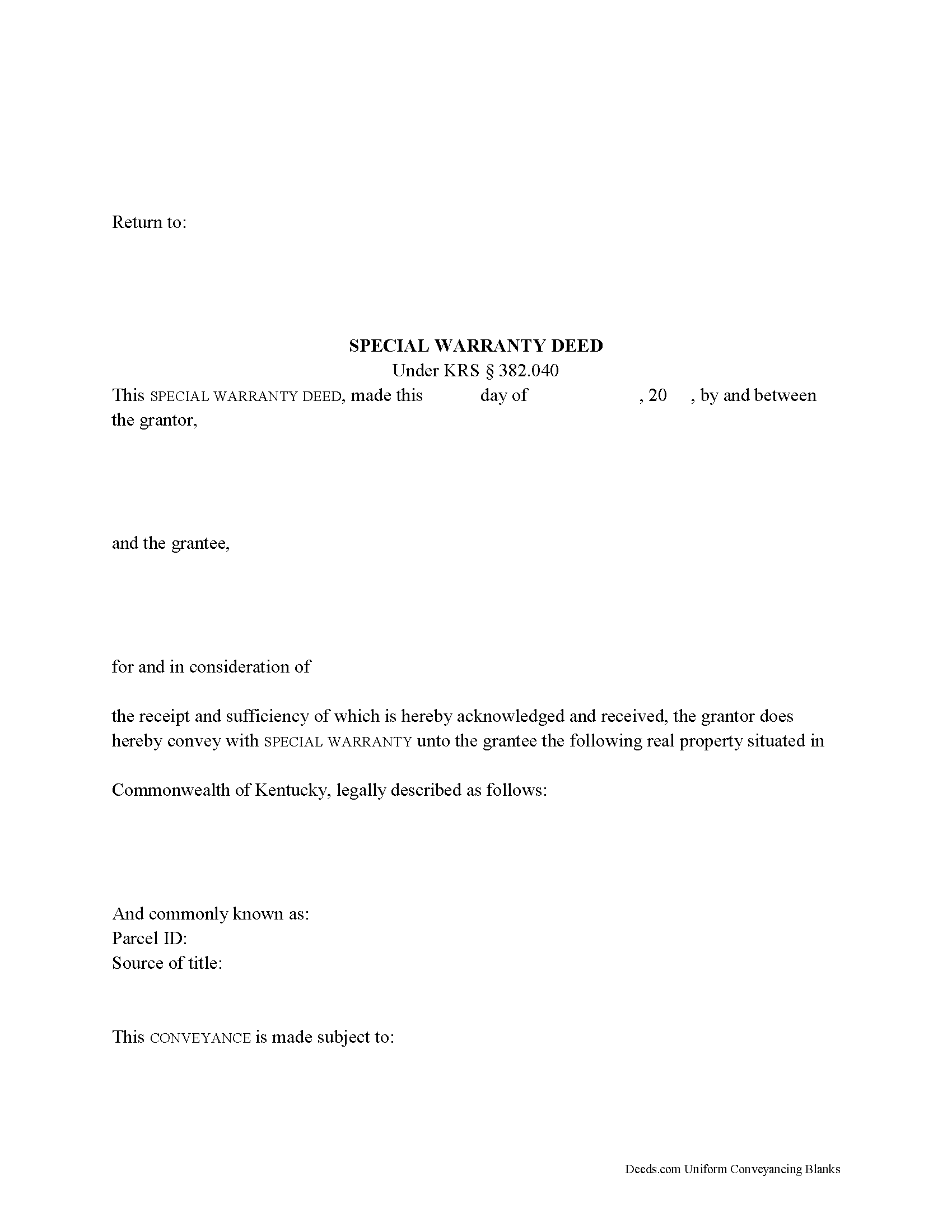
Real property conveyances are governed by Chapter 382 of the Kentucky Revised Statutes.
Special warranty deeds are statutory under KRS 382.040 and transfer ownership of real property from the grantor (the seller) to the grantee (the buyer) with limited warranties of title. They provide guarantees that the grantor is the true owner of the property, has the legal right to convey it, and will defend the title against any claims originating from the time they owned the property. However, the grantor does not guarantee that there are no other title defects before they owned it, so this type of deed offers more protection for the grantor, and less for the grantee.
A lawful special warranty deed includes the names and addresses of each grantor and grantee. Kentucky requires all recorded documents or documents affecting a change in property ownership to contain information on how the grantee will hold title. For residential property, the primary methods for holding title in co-ownership are tenancy in common, joint tenancy, and tenancy by entirety. A grant of ownership of real estate to two or more persons creates a tenancy in common, unless otherwise specified. Tenancy by entirety i... More Information about the Kentucky Special Warranty Deed
Grant Deed
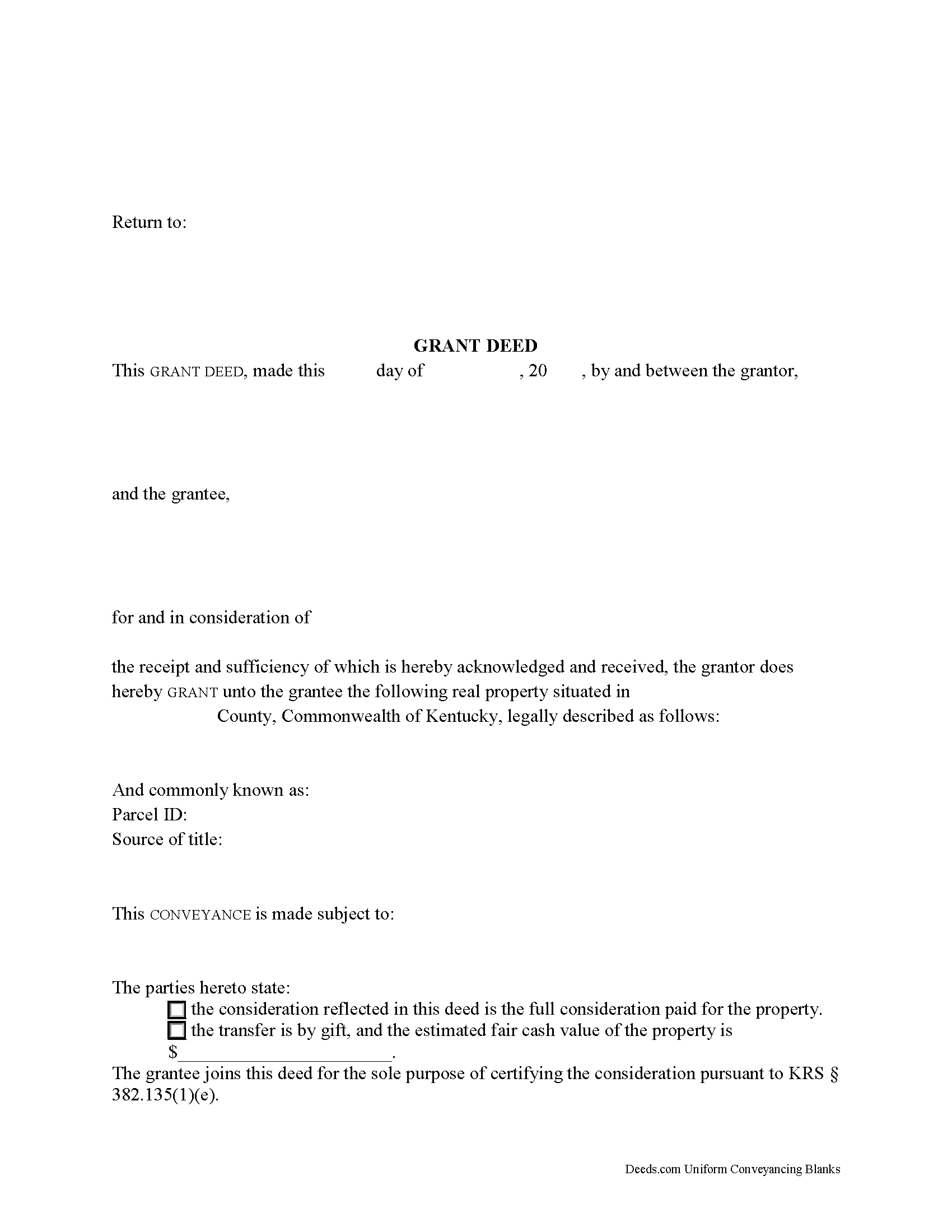
Real estate conveyances in Kentucky are governed by Chapter 382 of the Kentucky Revised statutes, but the statutes do not specifically address grant deeds.
A grant deed is a legal document used to transfer, or convey, rights in real property from a grantor (seller) to a grantee (buyer). A recorded grant deed imparts notice of transfer to all persons, including subsequent purchasers or mortgagees. They contain covenants, or guarantees, that the grantor has not previously sold the real property interest being conveyed, and that the property is being conveyed to the grantee without any undisclosed liens or encumbrances. Grant deeds do not generally require the grantor to defend title claims.
The deed must meet all state and local standards for recorded documents. A lawful grant deed identifies the grantor and grantee, with their full names and addresses, and states how the grantee will hold title to the property. For Kentucky residential property, the primary methods for holding title in co-ownership are tenancy in common, joint tenancy, and tenancy by entirety. A grant of ownership of real estate to two or more persons creates a tenancy in common, unless otherwise specified (KR... More Information about the Kentucky Grant Deed
Correction Deed
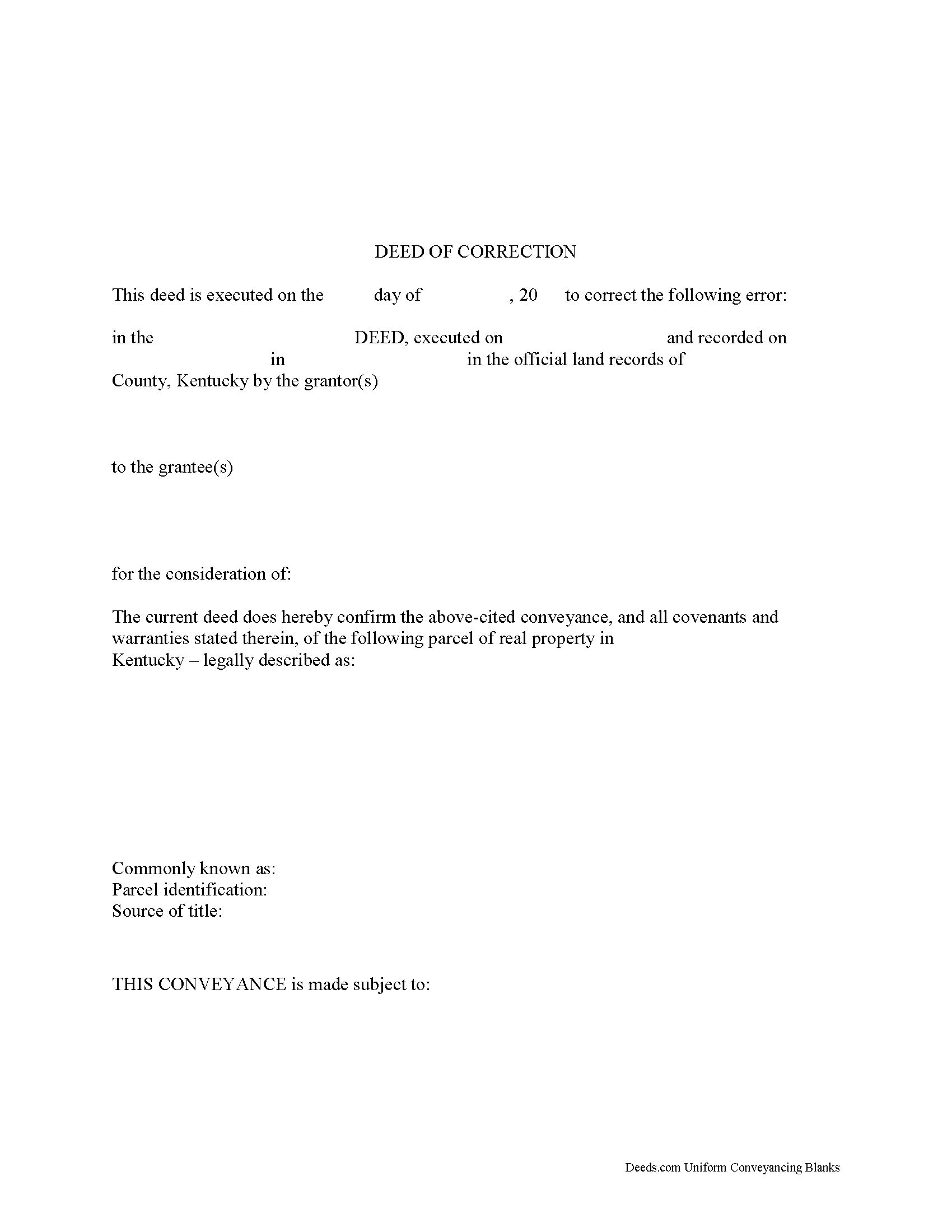
In Kentucky, use a correction deed to amend a previously recorded deed that contains a minor error.
A corrective deed is in effect an explanation and correction of an error in a prior instrument. As such, it passes no title, but only reiterates and confirms the prior conveyance. It must be executed from the original grantor(s) to the original grantee(s), and it needs to be recorded in order to be legally valid.
The correction deed must reference the original conveyance it is correcting by type of error, date of execution and recording, as well as by recording number and location. Beyond that, it restates the information given in the prior deed, thus serving as its de facto reiteration. The prior deed, however, which constitutes the actual conveyance of title, remains on record.
Deeds of correction are most appropriate for minor errors and omissions in the original deed, such as misspelled names, omission of marital status, or typos in the legal description. When making more substantial changes, for example to the vesting information or legal description of the property, it is best to seek legal advice regarding the long-term consequences.
Kentucky statutes give the f... More Information about the Kentucky Correction Deed
Easement Deed
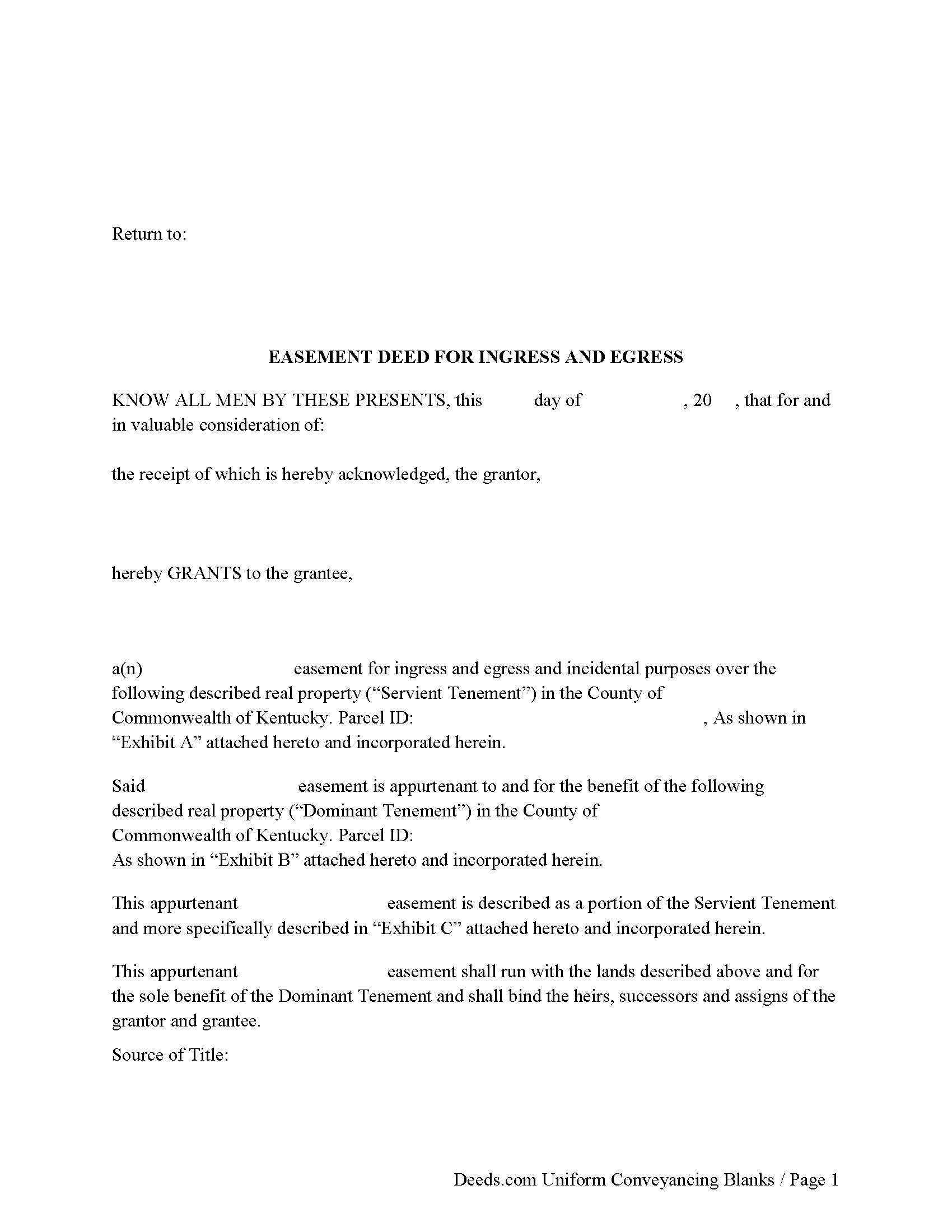
An easement is the right of one person to use the real property of another person for a specific purpose without actually possessing the property. Easements are either affirmative or negative. An easement deed is the instrument which creates this right. In Kentucky, easements can be created by deed and are subject to the same formalities as other instruments of real property.
Every deed in Kentucky, unless an exception is made, is construed to include all buildings, privileges, and appurtenances of every kind attached to the land being conveyed (381.200).
Additional easements, such as solar and conservation easements can also be obtained. A conservation easement is a non-possessory interest of a holder in real property imposing limitations or affirmative obligations for the purpose of retaining or protecting the natural, scenic, or open space values of real property (382.800). This type of deed may be created, conveyed, recorded, assigned, released, modified, terminated, or otherwise altered or affected in the same manner as other easements (382.810).A solar easement can be obtained in Kentucky for the purpose of ensuring access to direct sunlight. This type of easement shou... More Information about the Kentucky Easement Deed
Termination, Cancellation of Easement / Right of Way
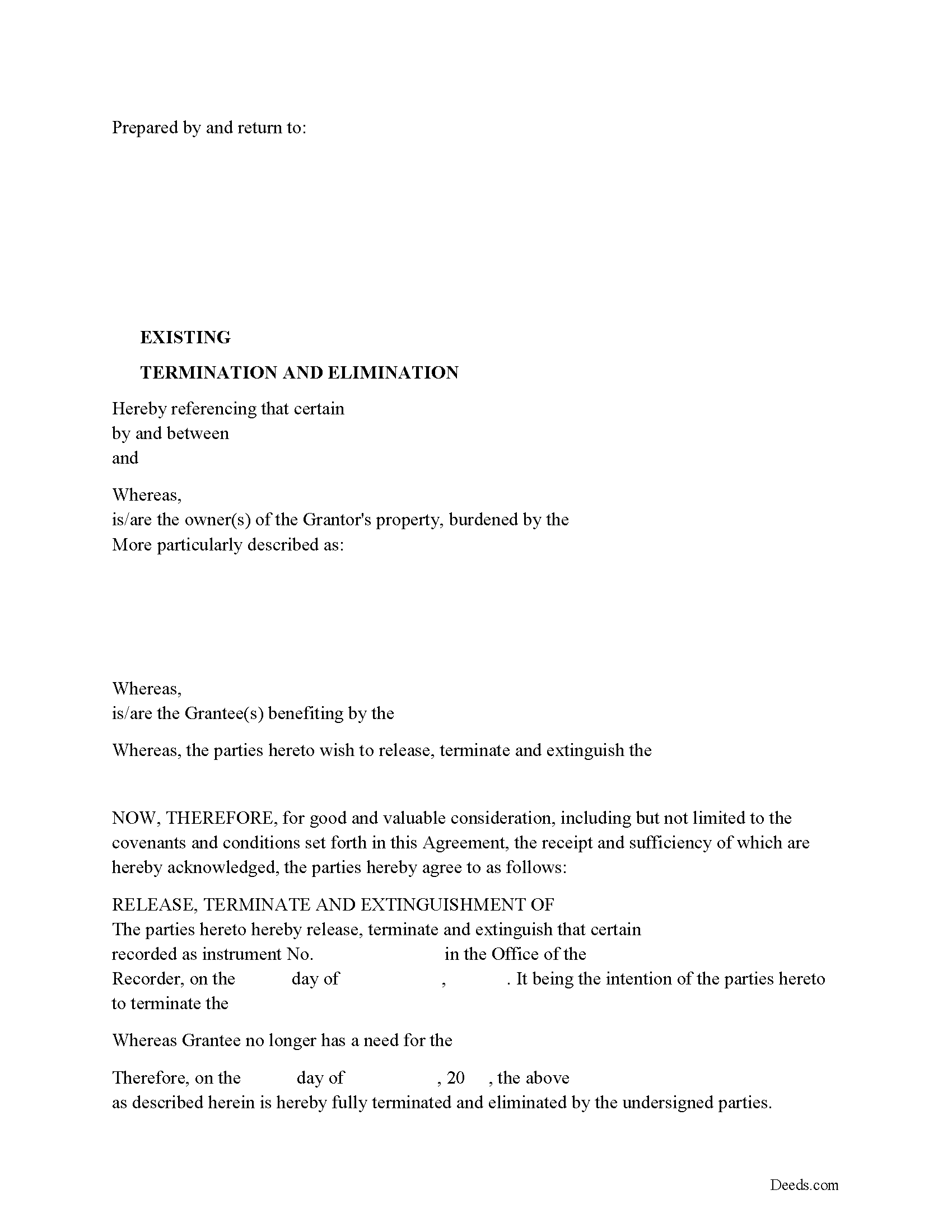
Use this form to release, terminate, extinguish a previously recorded document that involves access to and from a property.
Documents such as:
1. Easement Deeds or Agreements (An easement is a non-possessory interest in land, granting the right to use someone else's property for a specific purpose, like a driveway or utility line)
2. Access Roads
3. Right of Ways
4. Utility Easements (Power, Gas, Water, Sewer, Etc.)
5. Drainage Easements
This document allows the owner of the land, burdened by the access and the party that benefits from the access, to sign an agreement releasing the property from such access, ... More Information about the Kentucky Termination, Cancellation of Easement / Right of Way
Mineral Deed
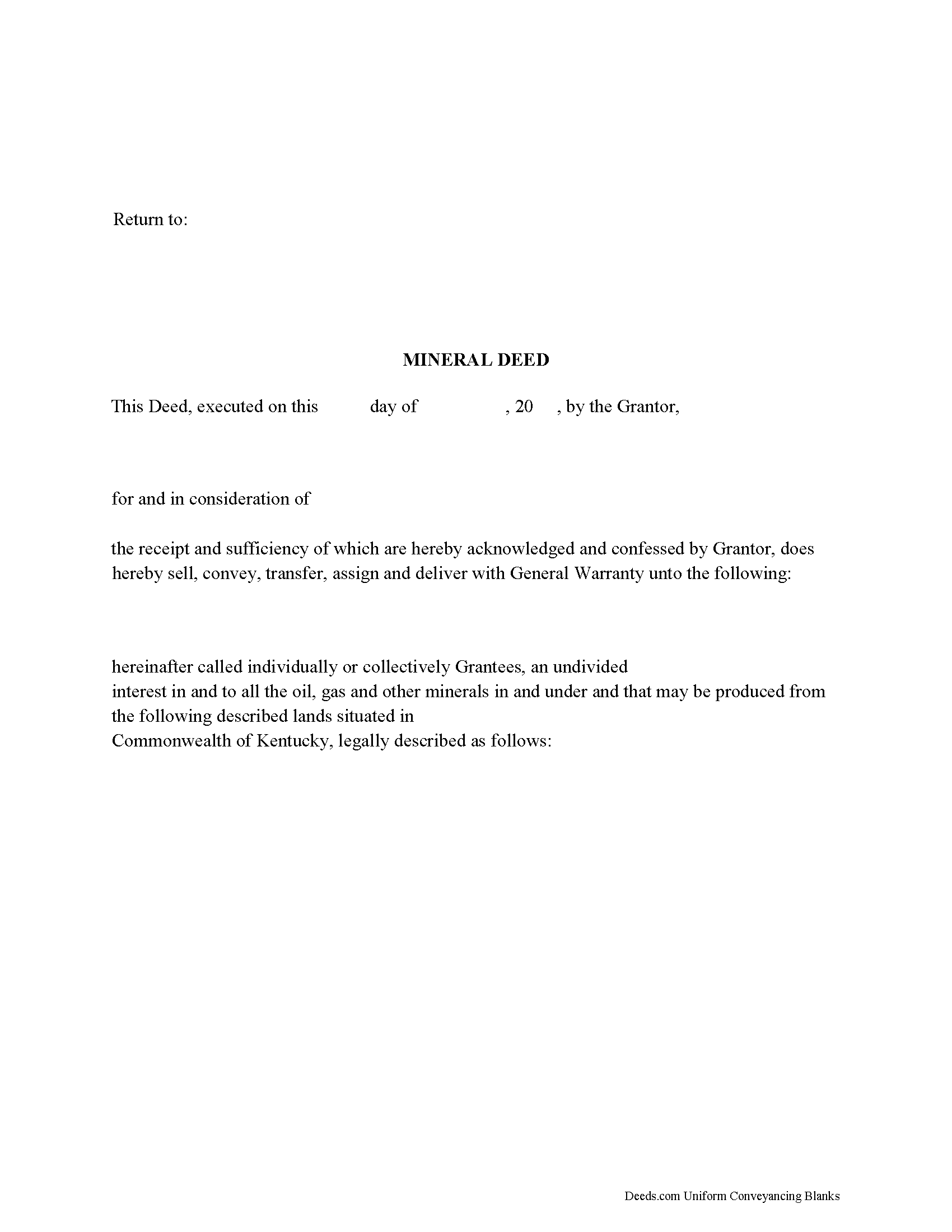
The General Mineral Deed in Kentucky transfers oil, gas, and mineral rights from the grantor to the grantee. THIS IS NOT A LEASE. There are no Exceptions or Reservations included.
The transfer includes the oil, gas and other minerals of every kind and nature. It also transfers any and all rights to receive royalties, overriding royalties, net profits interests or other payments out of or with respect to those oil, gas and other minerals. The Grantor can stipulate the percentage of Mineral Rights the Grantee will receive and is made subject to any rights existing under any valid and subsisting oil and gas lease or leases of record.
This general mineral deed gives the grantee the right to access, for the purpose of mining, drilling, exploring, operating and developing said lands for oil, gas, and other minerals, and storing handling, transporting and marketing of such.
In this document the Grantor Warrants and will defend said Title to Grantee. Use of this document has a permanent effect on your rights to the property, if you are not completely sure of what you are executing seek the advice of a legal professional.
(Kentucky Mineral Deed Package includes form, guidelines,... More Information about the Kentucky Mineral Deed
Mineral Deed with Quitclaim Covenants
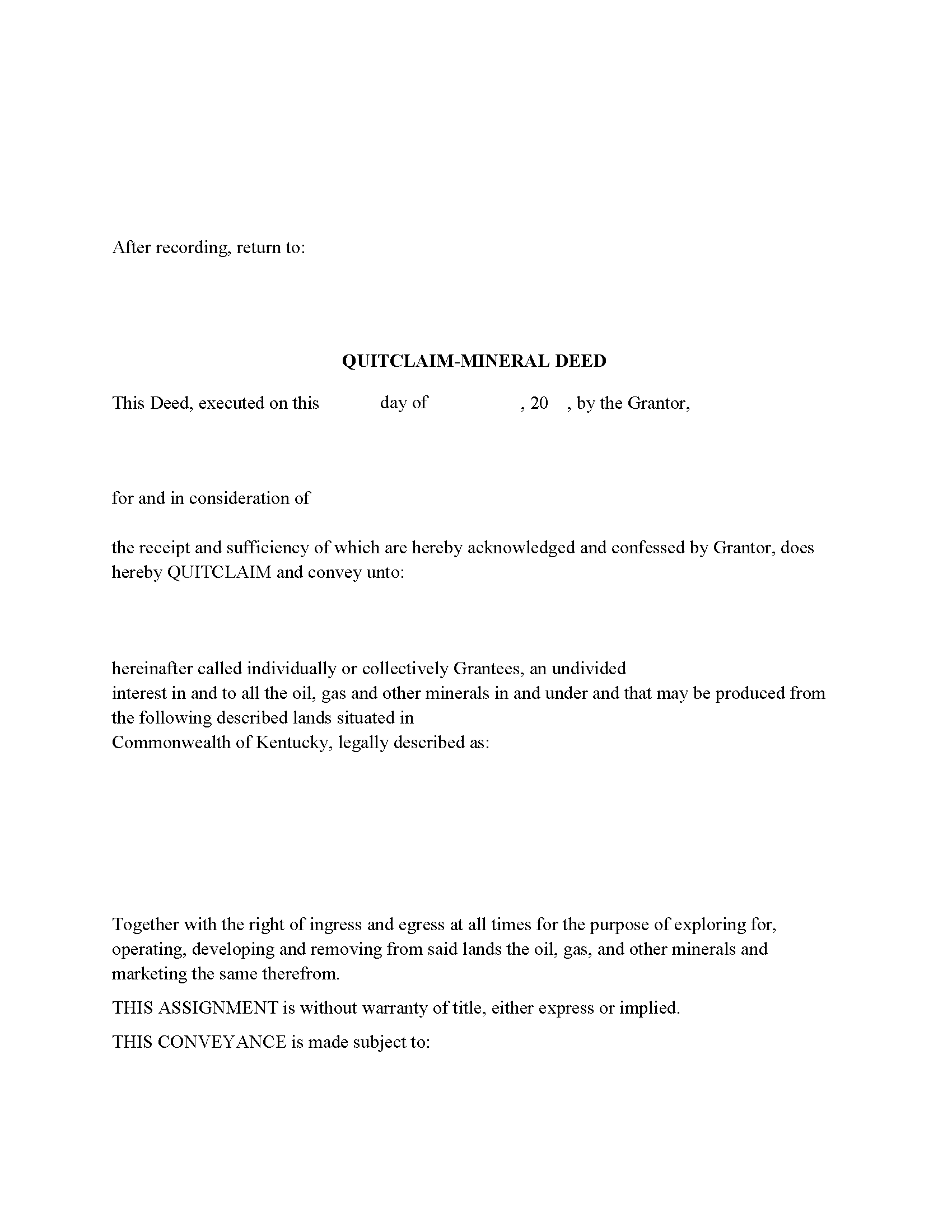
The General Mineral Deed in Kentucky Quitclaims oil, gas, and mineral rights from the grantor to the grantee. THIS IS NOT A LEASE. There are no Exceptions or Reservations included.
The transfer includes the oil, gas and other minerals of every kind and nature. The Grantor can stipulate the percentage of Mineral Rights the Grantee will receive.
This general mineral deed gives the grantee the right to access, for the purpose of mining, drilling, exploring, operating and developing said lands for oil, gas, and other minerals, and storing handling, transporting and marketing of such.
The seller, or grantor Quitclaims the mineral rights and does NOT accept responsibility to any discrepancy of title (This assignment is without warranty of title, either express or implied)
Uses: Mineral deeds with quitclaim are often used in situations where the grantor wants to quickly release any interest they might have in mineral rights, such as in settling estates, resolving disputes, clearing up uncertainties about ownership in a title's history or when mineral rights have previously been severed or fragmented from surface rights and cloud a title, making it difficult to transfer propert... More Information about the Kentucky Mineral Deed with Quitclaim Covenants
Affidavit of Surviving Joint Tenant
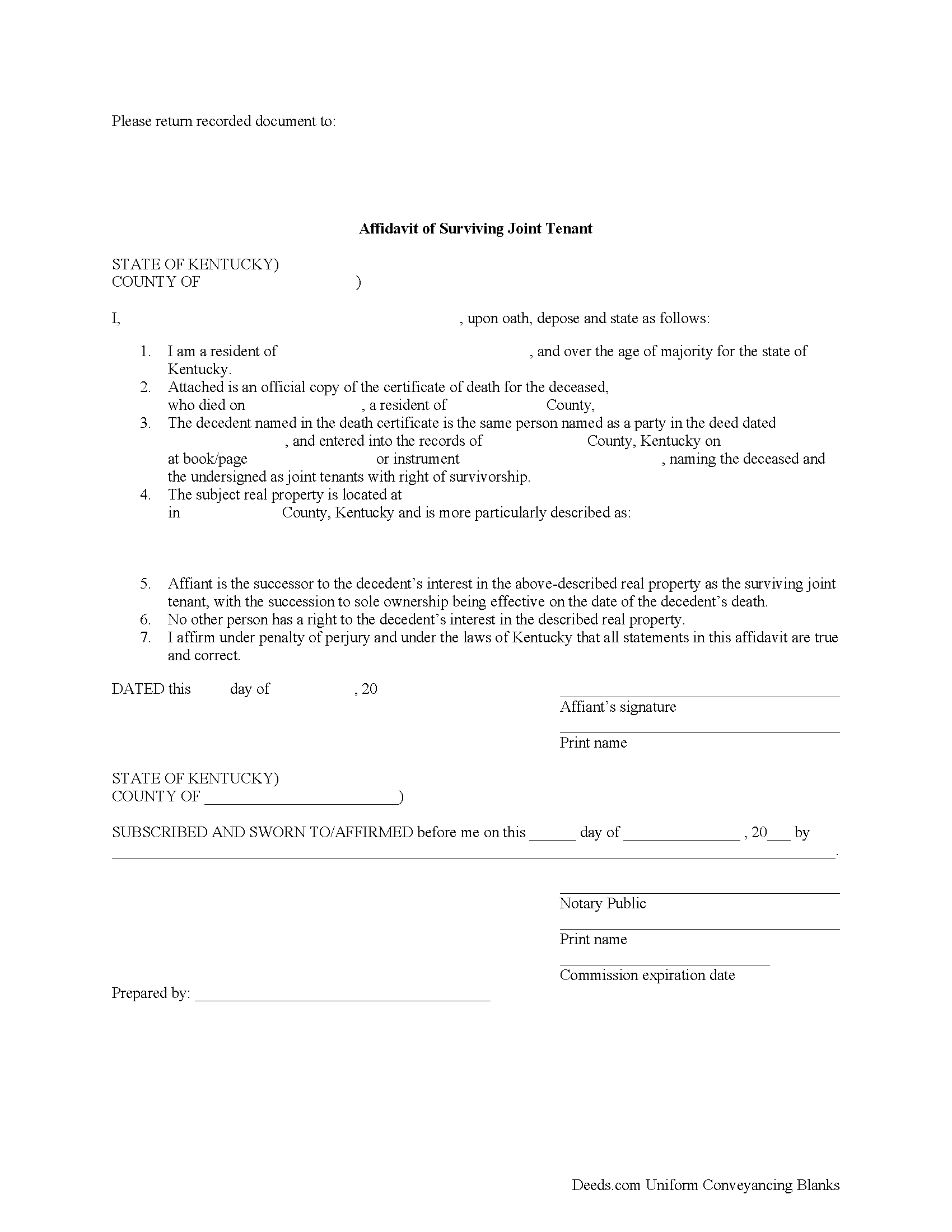
Real property ownership and conveyance is governed by Title XXII of the Kentucky Revised Statutes.
Kentucky's standard version of joint tenancy resembles tenancy in common, in that "when a joint tenant dies, the joint tenant's part of the joint estate, real or personal, shall descend to the joint tenant's heirs, or pass by devise, or go to the joint tenant's personal representative, subject to debts, curtesy, dower, or distribution" (KRS 318.120). Basically, this means that each joint tenant owns an individual share of the whole property.
Section 318.130 provides the rules for survivorship tenancy, in which the joint tenants share undivided rights to the whole property. By stating the intent to vest ownership as joint tenants with right of survivorship, when one owner dies, that portion is distributed equally among the survivors. Joint tenancy with right of survivorship is common between spouses.
In order to formalize the "automatic" transfer that occurs from a deceased joint tenant, many co-owners choose to record an affidavit of surviving joint tenant, accompanied by a certified copy of the decedent's death certificate. Recording such an affidavit provides notice to the ... More Information about the Kentucky Affidavit of Surviving Joint Tenant
Executor Deed
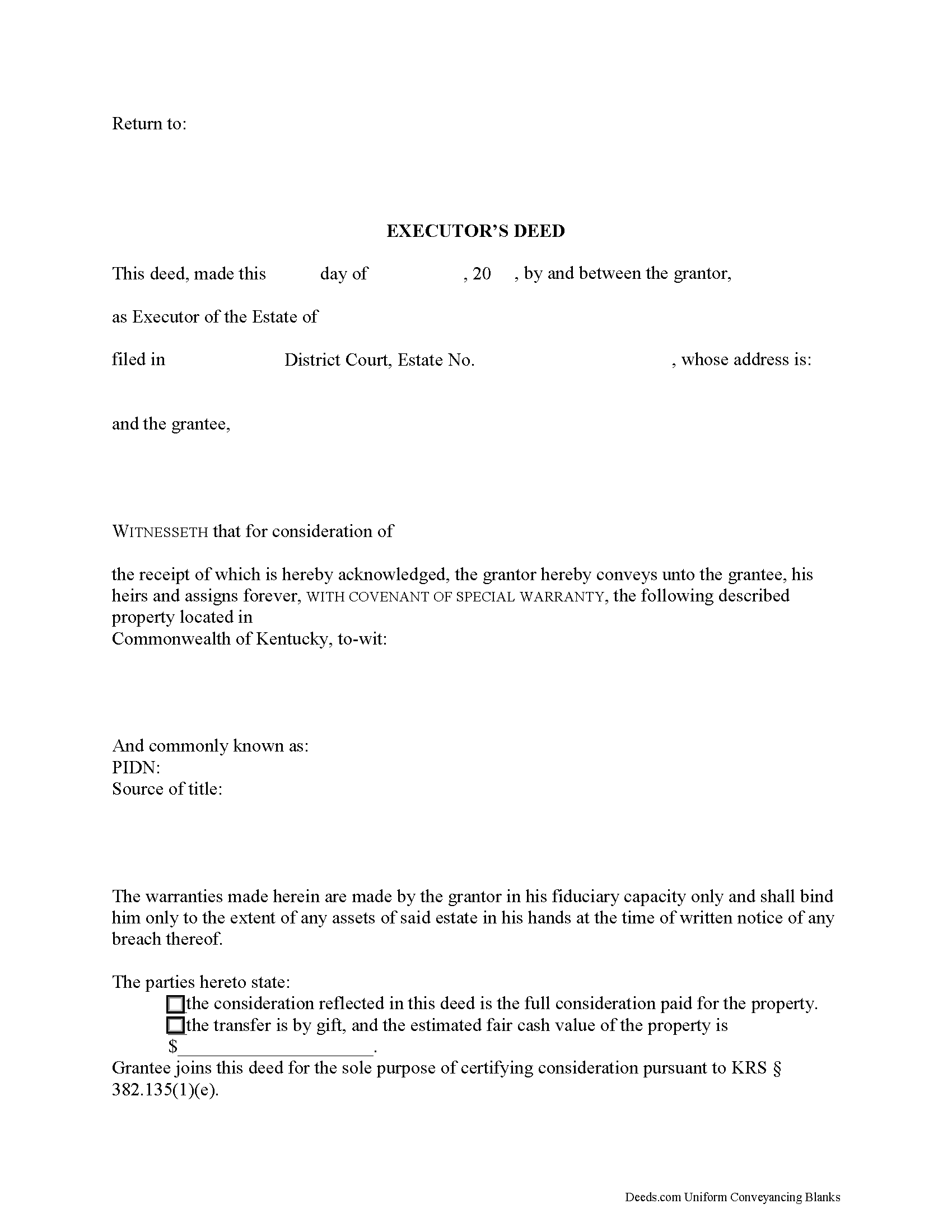
An executor's deed is a fiduciary instrument used in estate administration to transfer real property pursuant to the terms of a will and/or laws of descent. An executor is a personal representative who is named in a decedent's will to administer the decedent's estate.
Use an executor's deed to convey interest in real property to a grantee with a special warranty. This type of warranty affirms that, while the grantor/executor controlled the property, she never acted in a way to change the status of the title.
In addition to meeting state and local standards for real estate deeds, executor's deeds also include details about the decedent's probate case. A court order for sale is required before a transfer can be made, unless the decedent's will specifies a power of sale. Supporting documentation, such as an affidavit of real property transfer under KRS 382.135(4), is required before an executor can record the deed in the office of the county clerk.
Contact a lawyer with questions about Kentucky executor's deeds or other inquiries related to probate.
(Kentucky Executor Deed Package includes form, guidelines, and completed example)... More Information about the Kentucky Executor Deed
Administrator Deed
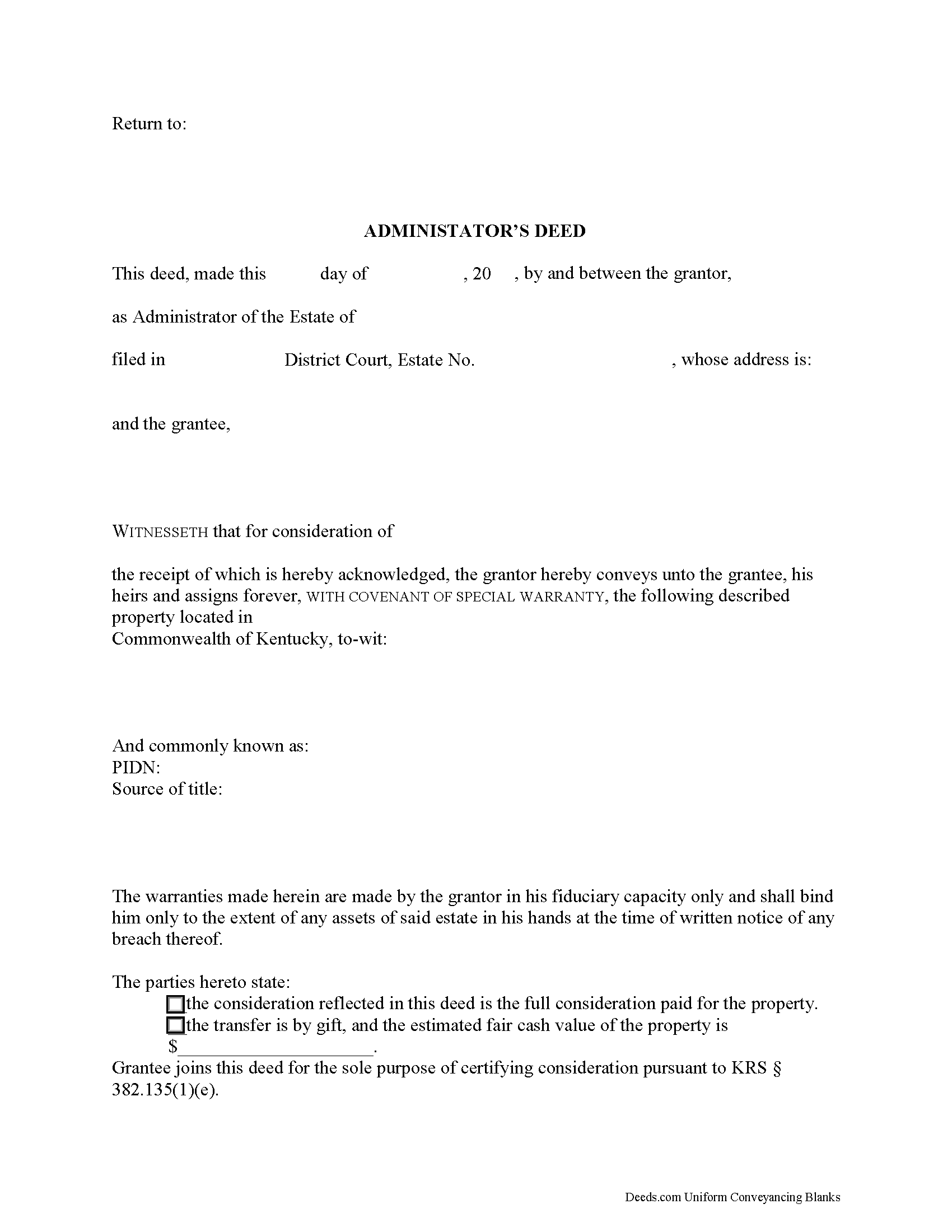
An administrator's deed is a fiduciary instrument used in estate administration to transfer real property pursuant to laws of intestate succession. An administrator is a personal representative selected by the probate court to administer a decedent's intestate estate.
Use an administrator's deed to convey interest in real property to a grantee with a special warranty. This type of warranty affirms that, while the grantor/administrator controlled the property, she never acted in a way to change the status of the title.
In addition to meeting state and local standards for real estate deeds, administrator's deeds also include details about the decedent's probate case. A court order for sale is required before a transfer can be made. Supporting documentation, such as an affidavit of real property transfer under KRS 382.135(4), is required before an administrator can record the deed in the office of the county clerk.
Contact a lawyer with questions about Kentucky administrator's deeds or other inquiries related to probate.
(Kentucky Administrator Deed Package includes form, guidelines, and completed example)... More Information about the Kentucky Administrator Deed
Affidavit of Descent
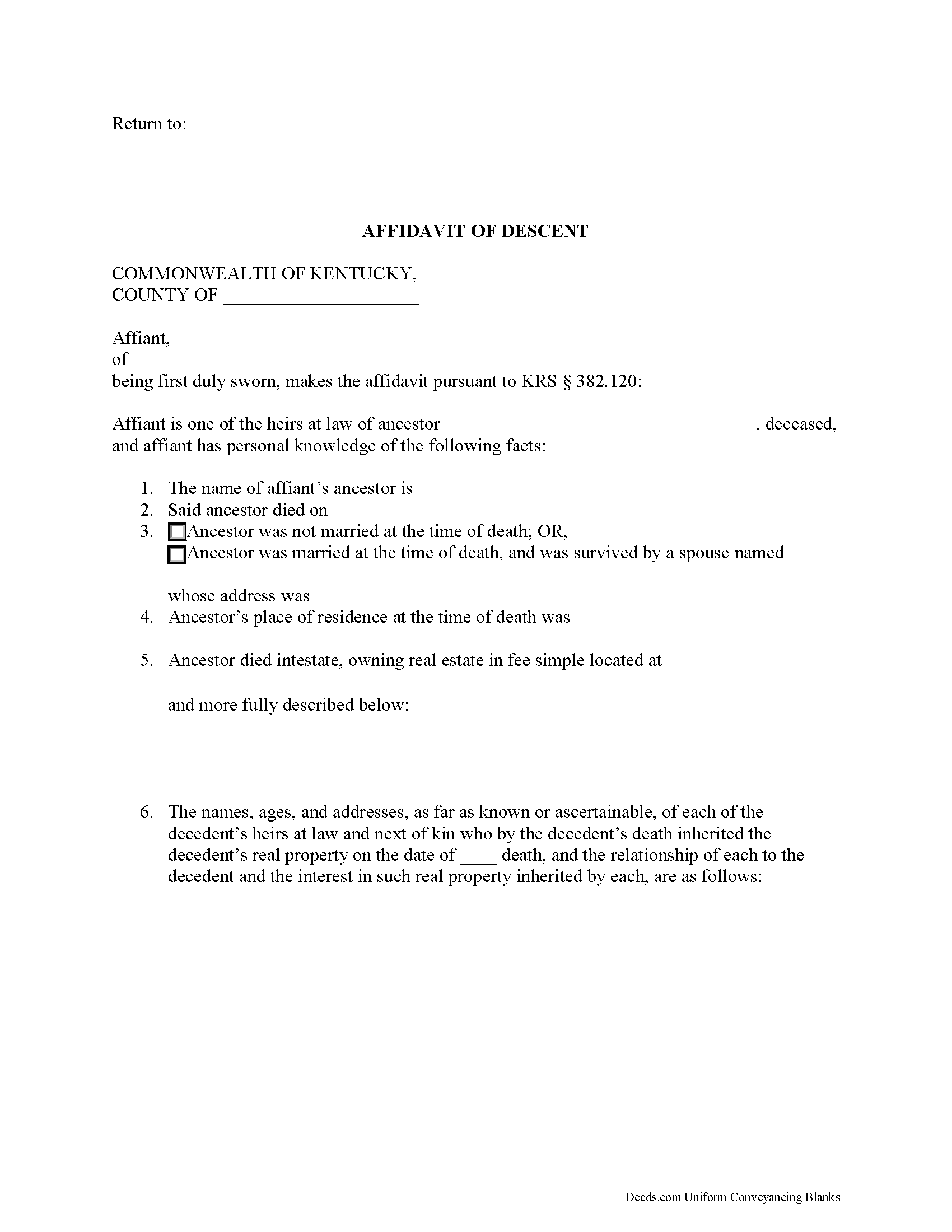
An affidavit of descent (alternately, affidavit of heirship) under KRS 382.120 establishes a source of title for a grantor who is transferring property he or she acquired from an intestate estate.
The affidavit must be filed before the grantor can record a deed conveying the subject property. Pursuant to Kentucky statute, the affiant (person making the sworn statements contained within the affidavit) may be the grantor or any one (1) of the heirs at law or next of kin of the ancestor of the grantor, or of two (2) residents of the Commonwealth of Kentucky.
The affidavit must recite the ancestor's name, date of death, and place of residence, as well as information regarding the ancestor's surviving spouse, if applicable. In addition, the affidavit must state that the ancestor died intestate (without a will), and contain a list of the names, ages, and addresses of each of the ancestor's heirs at law and next of kin, and include everyone's relationship to the ancestor and the interest in real property he or she inherited by the ancestor's death.
The affiant must sign the document before a notary public before filing in the office of the county clerk of the county wherein th... More Information about the Kentucky Affidavit of Descent
Limited Power of Attorney for the Purchase of Real Property
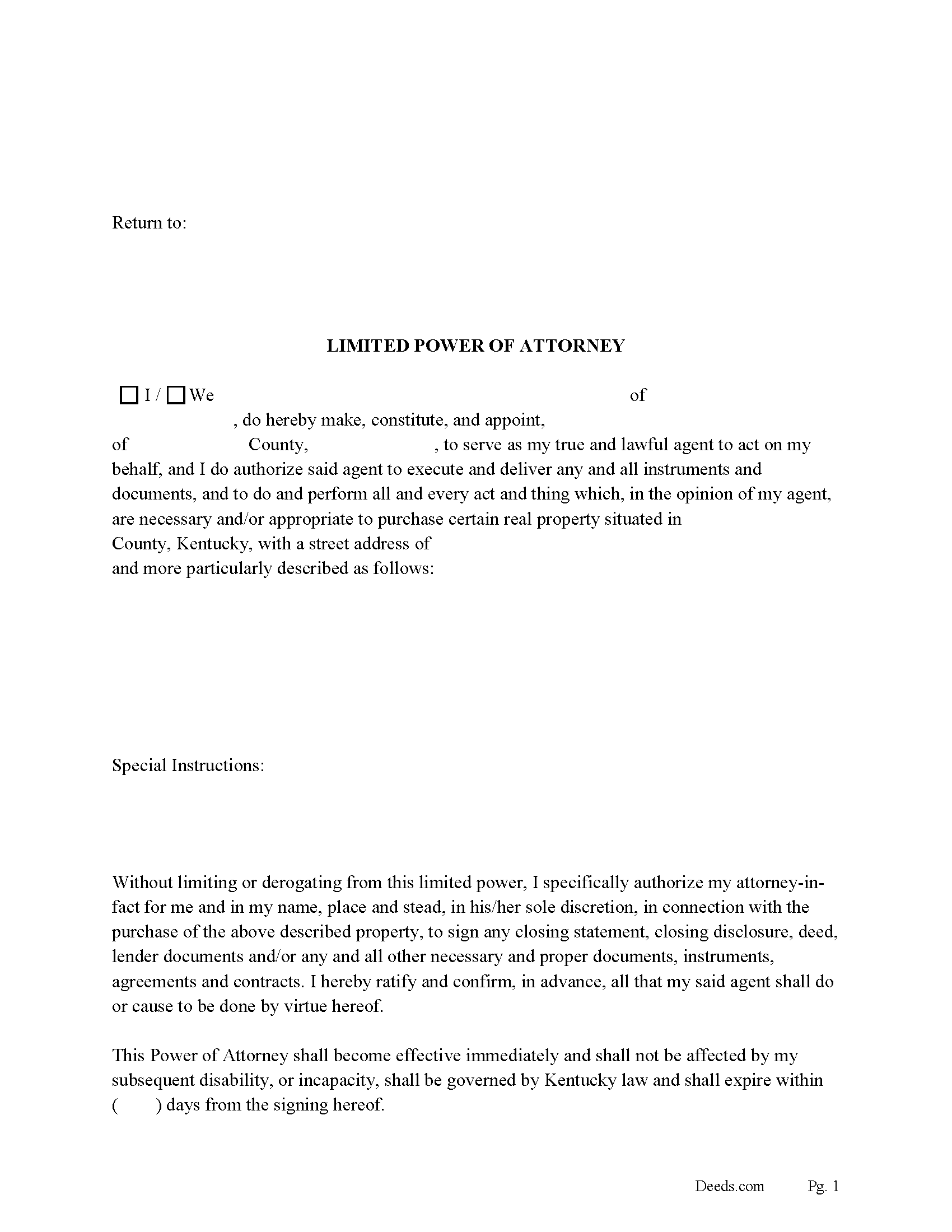
Use this document to empower your agent with the right to Purchase a specific property on your behalf. The Agent shall be entitled to enter into any documents upon said property which are your responsibility under law, and you give and grant unto said agent full power and authority to do and perform all and every act and thing whatsoever requisite and necessary to be done in and about the premises, as fully and to all intents and purposes, as you might or could do if personally present at the doing thereof. This form includes a "Special Instructions" section where you can further limit or define the Agent's powers, if needed.
This Limited Power of Attorney for the purchase of real property becomes effective upon its execution. 457.060
Validity of power of attorney.
(1) A power of attorney executed in this state on or after July 14, 2018, is valid if its execution complies with KRS 457.050.
457.050 Execution of power of attorney.
(1) A power of attorney must be signed in the presence of two disinterested witnesses by the principal or in the principal's conscious presence by another individual directed by the principal to sign the principal's name on the power of attorney.... More Information about the Kentucky Limited Power of Attorney for the Purchase of Real Property
Limited Power of Attorney for the Sale of Property
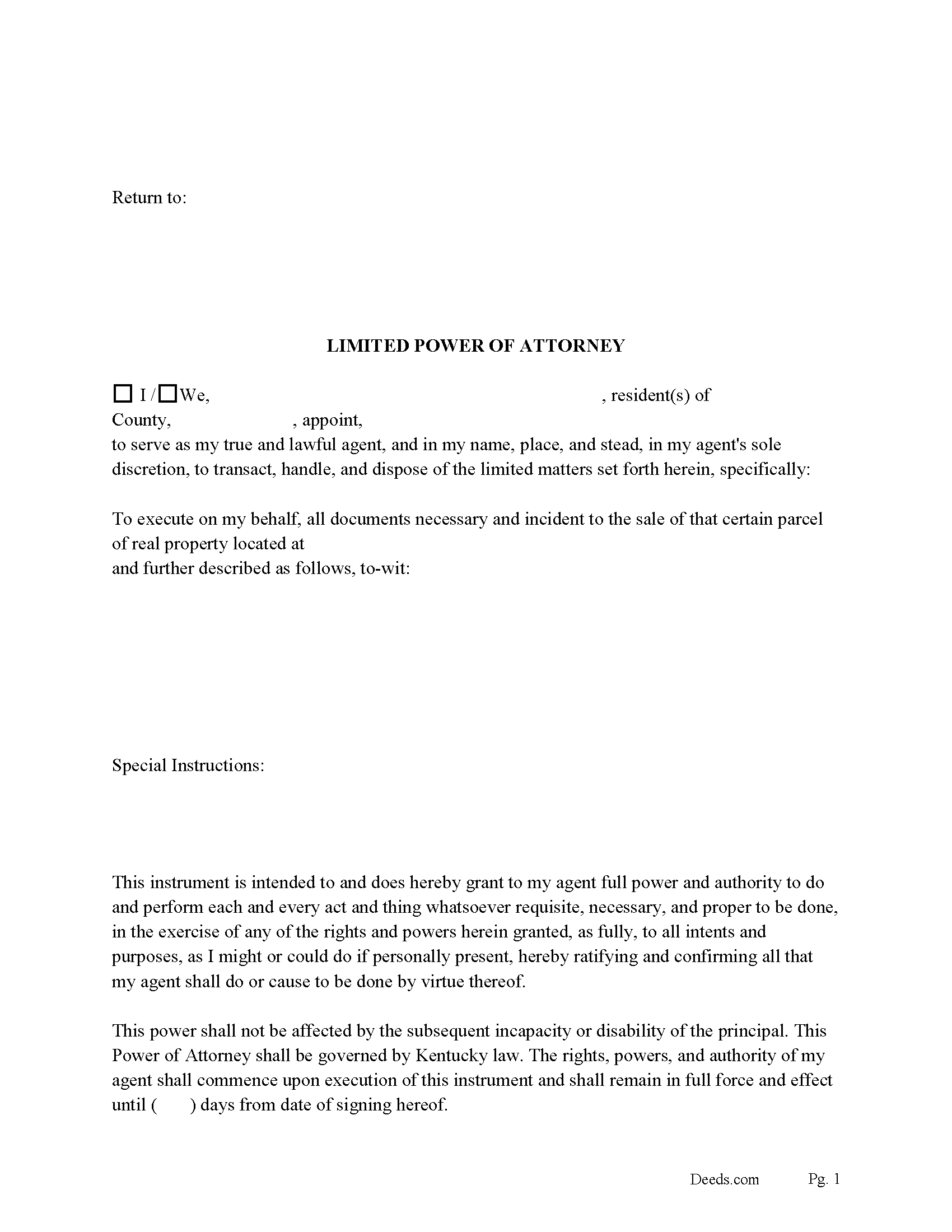
This form is used for the SALE of real property. The principal designates an agent and empowers him/her to act in all necessary legal documents and instruments for the sale of a specific Kentucky property. This form includes a "Special Instructions" section where you can further limit or define the agent's powers/actions.
This Limited Power of Attorney becomes effective upon its execution.
457.060 Validity of power of attorney.
(1) A power of attorney executed in this state on or after July 14, 2018, is valid if its execution complies with KRS 457.050.
457.050 Execution of power of attorney.
(1) A power of attorney must be signed in the presence of two disinterested witnesses by the principal or in the principal's conscious presence by another individual directed by the principal to sign the principal's name on the power of attorney. If signed in the principal's conscious presence by another individual, the reason for this method of signing shall be stated in the power of attorney.
(2) A signature on a power of attorney is presumed to be genuine if the principal acknowledges the signature before a notary public or other individual authorized by law to take acknowledgm... More Information about the Kentucky Limited Power of Attorney for the Sale of Property
Durable Power of Attorney
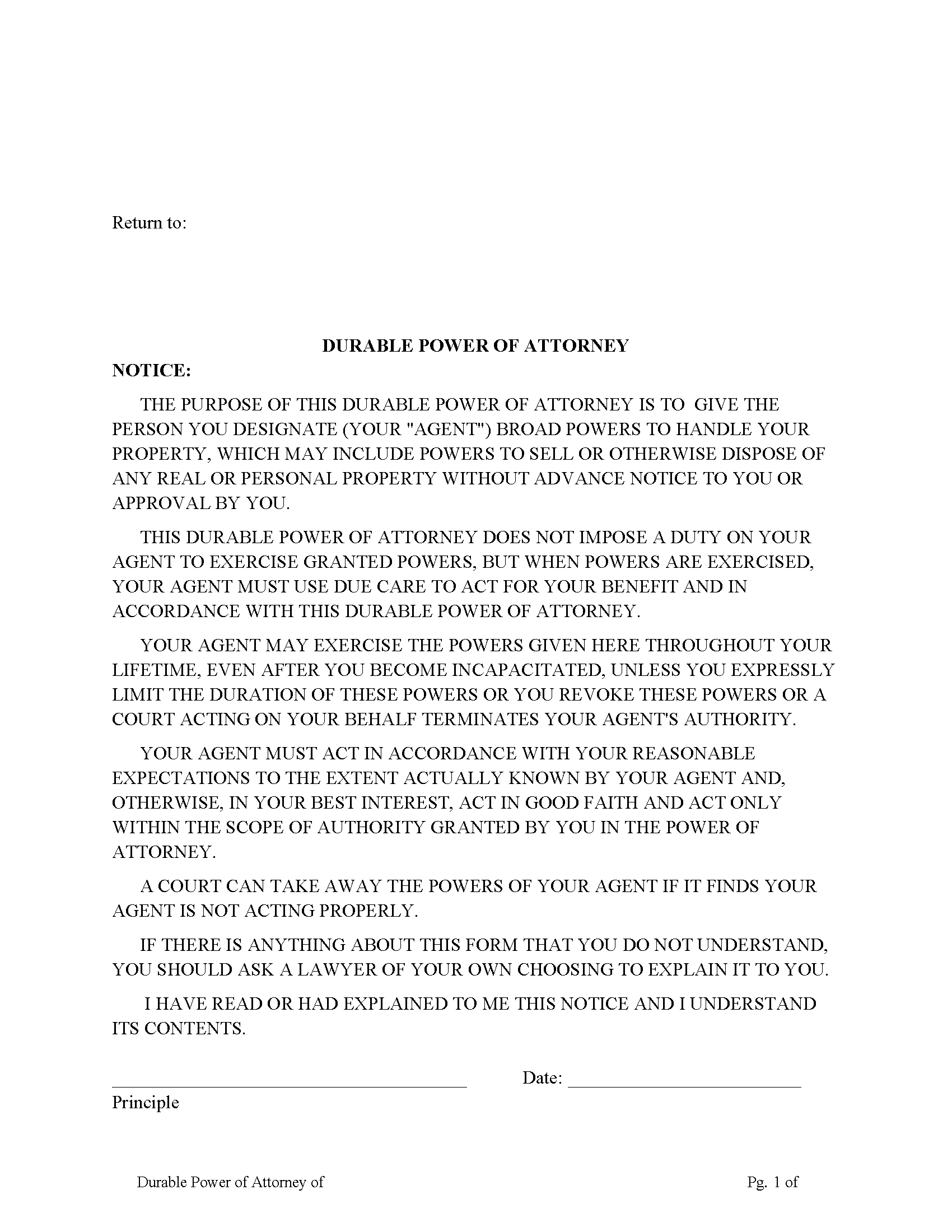
Durable Power of Attorney under the laws of the Commonwealth of Kentucky
1. Powers Regarding My Assets. My agent shall have the following powers with respect to my assets: (Subjects Addressed)
(a) Invest, sell, purchase, lease, borrow and encumber assets.
(b) Deal with real property.
(c) Collect and recover assets.
(d) Deal with insurance.
(e) Deal with financial institutions.
(f) Represent me in all tax matters.
(g) Employ others.
(h) Enter, establish, close, or maintain safe deposit boxes.
(i) Litigate.
(j) Miscellaneous powers.
A. Incidental Powers.
B. Ratification.
C. Third Party Reliance.
D. Revocation and Amendment.
E. Protective Proceedings.
F. Interpretation and Governing Law. This instrument is to be construed and interpreted as a General Durable Power of Attorney. The enumeration of specific powers herein is not intended to, nor does it, limit or restrict the general powers herein granted to my Attorney-in-Fact. For a third party to construe otherwise would be contrary to my intent. This instrument is executed and delivered in the Commonwealth of Kentucky and the laws of the Commonwealth of Kentucky shall govern all questions as to the vali... More Information about the Kentucky Durable Power of Attorney
Notice of Furnishing
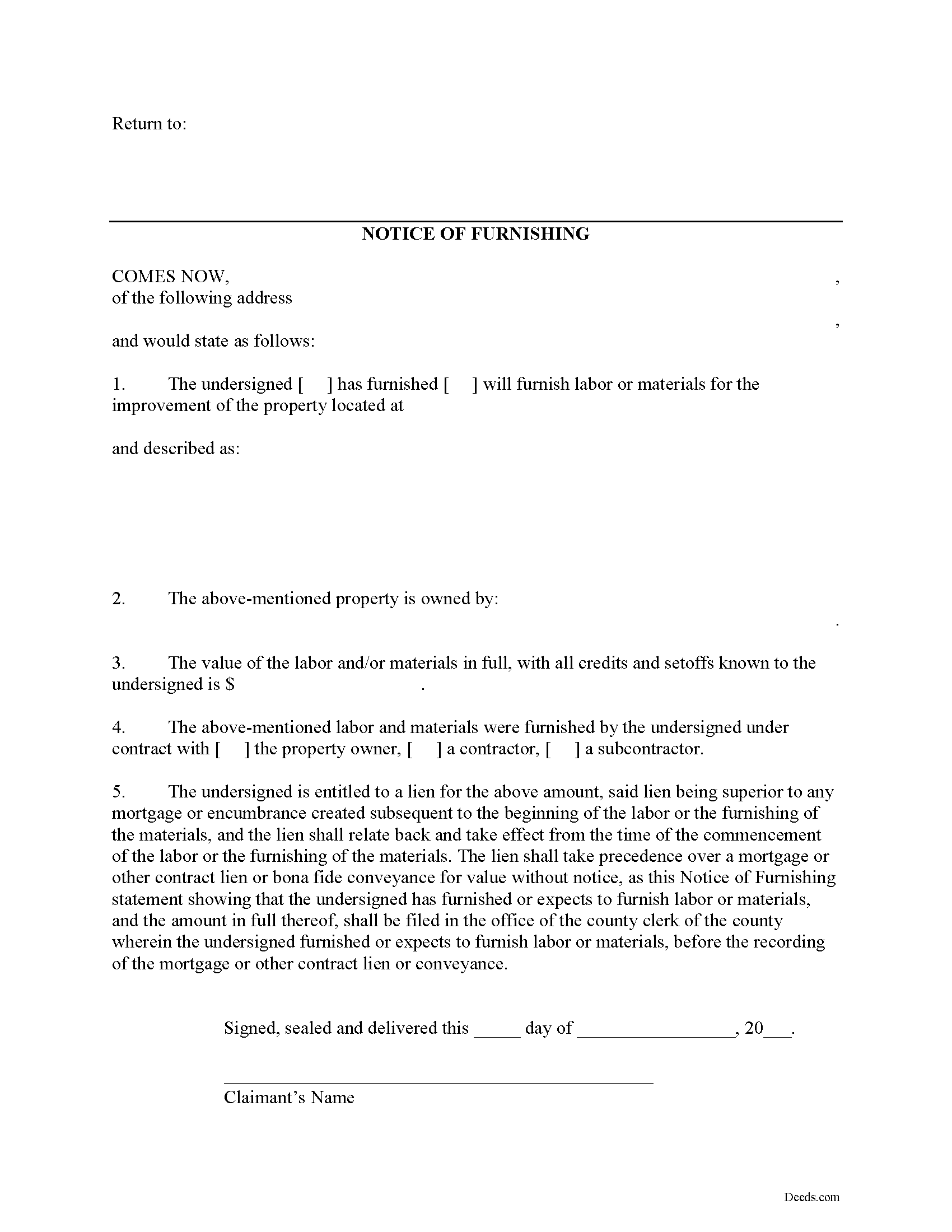
The Notice of Furnishing is used to certify that labor and/or materials were furnished, or will be furnished upon a specific property identified in the Notice.
In Kentucky, any lien will be dissolved unless the claimant, within six (6) months after he ceases to labor or furnish materials, files, in the office of the county clerk of the county in which the building or improvement is situated, a statement of the amount due him, with all just credits and set-offs known to him, together with a description of the property intended to be covered by the lien sufficiently accurate to identify it, the name of the owner, if known, and whether the materials were furnished or the labor performed by contract with the owner or with a contractor or subcontractor. K.R.S. 376.080(1).
This article is provided for information purposes only and should not be relied on as a substitute for the advice from a legal professional. If you have any questions about preliminary notice, or any other issues related to liens in Kentucky, please speak with a licensed attorney.... More Information about the Kentucky Notice of Furnishing
Notice to Owner
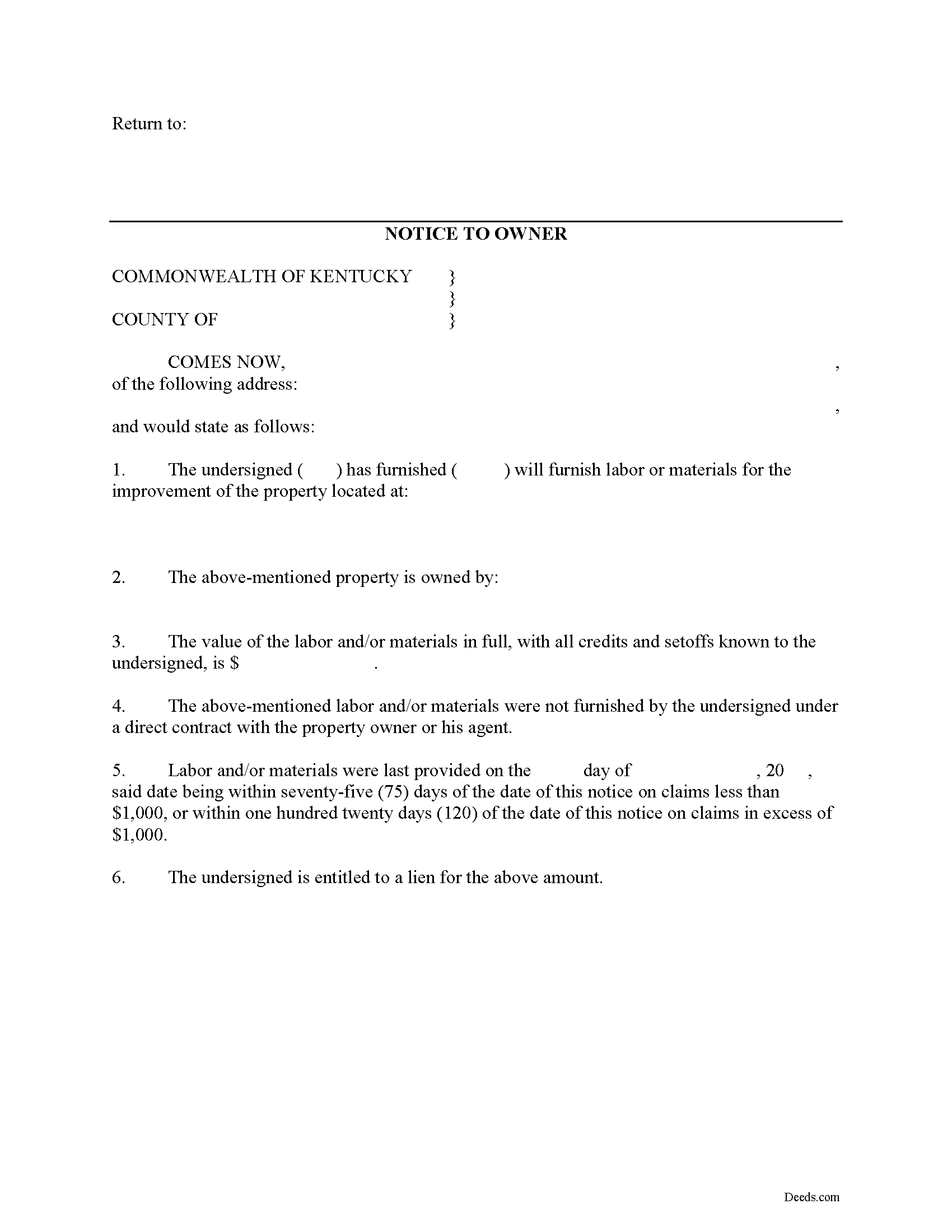
Notice to Owner -- Preliminary Notice in Kentucky
Most states require lien claimants to serve a preliminary (pre-lien) notice on a property owner or other party to ensure all interested parties have notification of who is involved in a construction job and who may have a claim to a mechanic's lien. In Kentucky, the Notice to Owner document fulfills this purpose.
No person who has not contracted directly with the owner or his agent is eligible to acquire a lien unless he notifies the owner (or his authorized agent) of the property to be held liable, in writing, within seventy-five (75) days on claims amounting to less than $1,000 and one hundred twenty (120) days on claims in excess of $1,000 after the last item of material or labor is furnished, of his intention to hold the property liable and the amount for which he will claim a lien. K.R.S. 376.010(3).
It shall be sufficient to prove that the notice was mailed to the last known address of the owner of the property upon which the lien is claimed, or to his duly authorized agent within the county in which the property to be held liable is located. Id.
The Notice to Owner document contains the following information: 1) ... More Information about the Kentucky Notice to Owner
Mechanics Lien
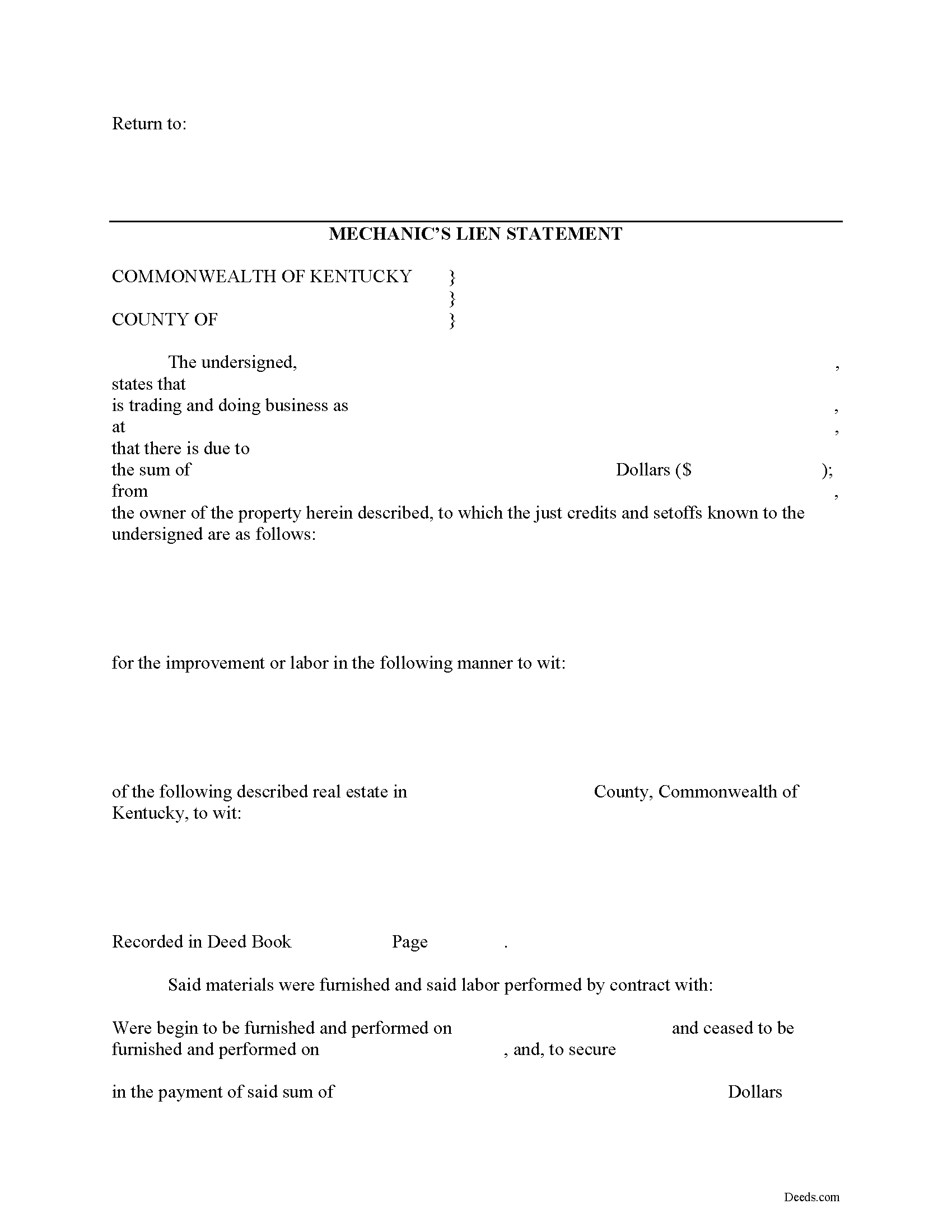
Claiming a Mechanic's Lien in Kentucky
Mechanic's Liens are used to place a block on a property owner's title when a contractor, materials supplier, or other laborer such as a subcontractor has not been paid for labor, materials, or equipment provided. In Kentucky, a lien is claimed by filing a Statement of Claim document with a county recorder.
To claim a lien in Kentucky, the claimant must file a statement of the account due to him within six (6) months after he ceases to labor or furnish materials. K.R.S. 376.080(1). The statement must be filed in the office of the county clerk of the county in which the building or improvement is situated. Id. The statement must include the amount due along with a description of all just credits and set-offs known to him, together with a description of the property intended to be covered by the lien sufficiently accurate to identify it, the name of the owner, if known, and whether the materials were furnished or the labor performed by contract with the owner or with a contractor or subcontractor. Id.
The lien statement also requires the name and address of the claimant; if the claimant is a corporation, the statement must include the n... More Information about the Kentucky Mechanics Lien
Discharge of Lien
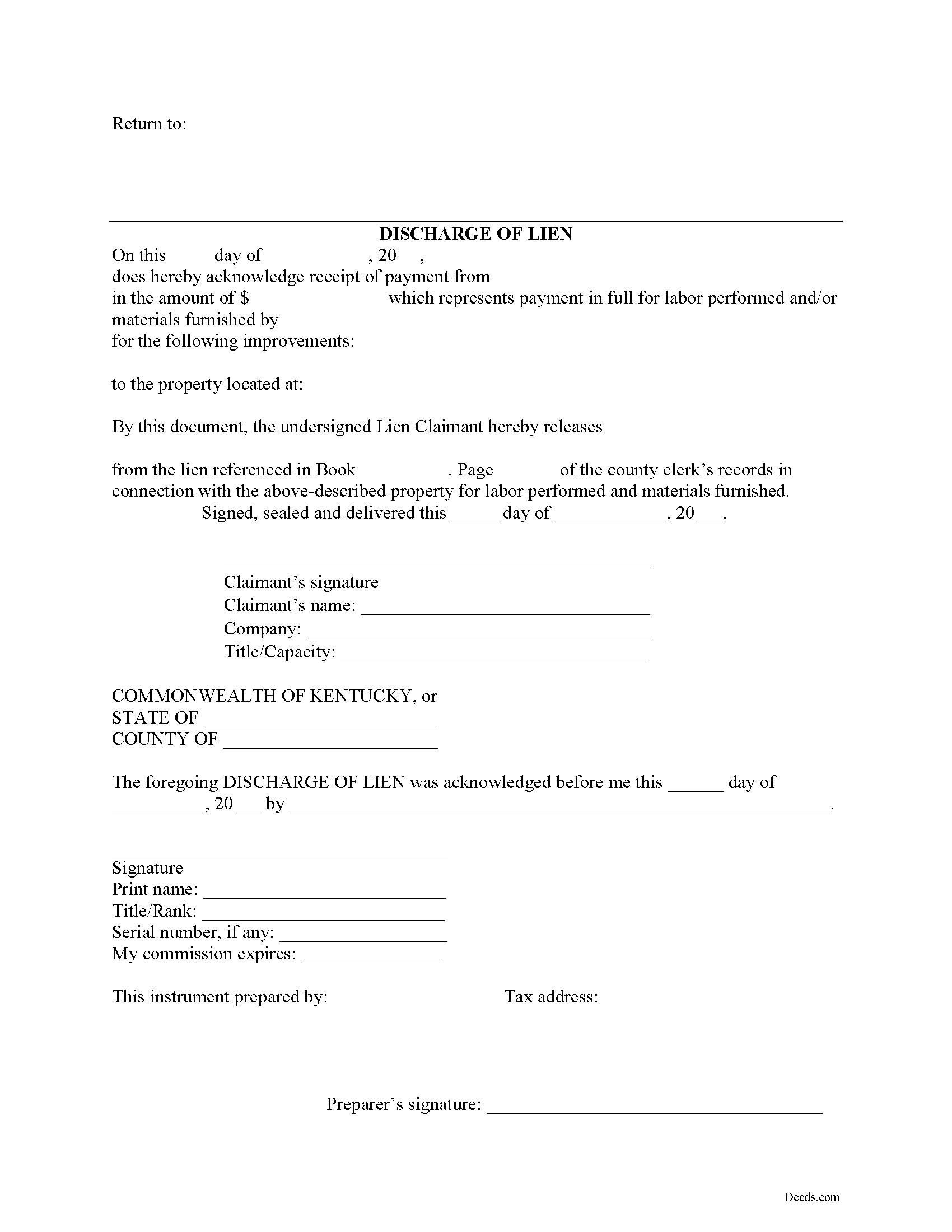
Discharging a Lien in Kentucky
When a lien has been paid off in full or is no longer necessary for any other reason, best practices direct the claimant to file a document discharging the lien. Kentucky does not provide for a specific mechanism of discharging a lien, as a lien already expires twelve months after its filing without any enforcement action. This document, however, reduces the amount of time a lien is in effect.
File the Discharge of Lien document in the county where the property is located (this should be the same location where the statement of lien was originally filed). The Discharge of Lien contains then following information: 1) name of the payor and payee; 2) payment amount; 3) name of person who originally furnished labor or materials; 4) description of items furnished; 5) address of the property; 5) the owner's name, and 6) the book and page number where the lien was recorded. Once the Discharge of Lien is filed and recorded, the lien will be struck from the record.
This article is provided for information purposes only and should not be relied on as a substitute for the advice from a legal professional. If you have questions about discharging a lien, ... More Information about the Kentucky Discharge of Lien
Discharge of Lien by Bond
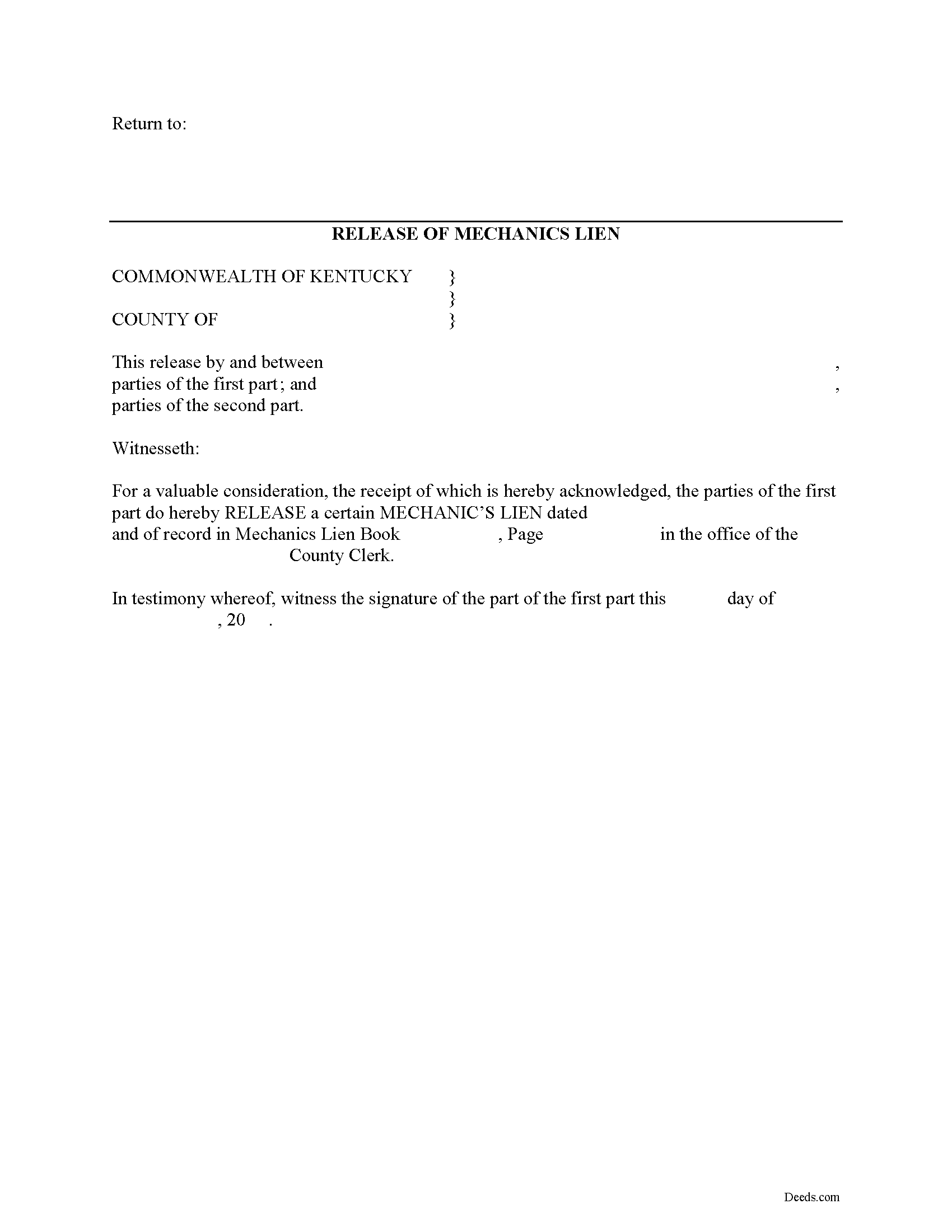
Release of Lien in Kentucky by Execution of Bond
Executing a bond is one way to remove mechanic's liens levied on a property. A bond is an amount that can be posted with a surety or other agency that guarantees payment to a contractor or other lien claimant. In return for this assurance, the claimants release the liens.
In Kentucky, the owner or claimant of a property covered by a lien, (or any contractor or other person contracting with the owner or claimant for the furnishing of improvements or services), may, at any time before a judgment is rendered to enforce the lien, execute with the county clerk in the county where the lien was filed, a bond for double the amount of the lien claimed. K.R.S. 376.100. The bond and release must be approved by the clerk and are conditioned upon the obligors satisfying any judgment that may be rendered in favor of the person asserting the lien. Id. So, if the lien is filed for $5,000, a bond of $10,000 must be executed to discharge the lien.
The release document identifies the parties, recording details of the filed lien, and the effective date of the release. The bond shall be preserved by the clerk, and upon its execution the lien u... More Information about the Kentucky Discharge of Lien by Bond
Partial Conditional Lien Waiver
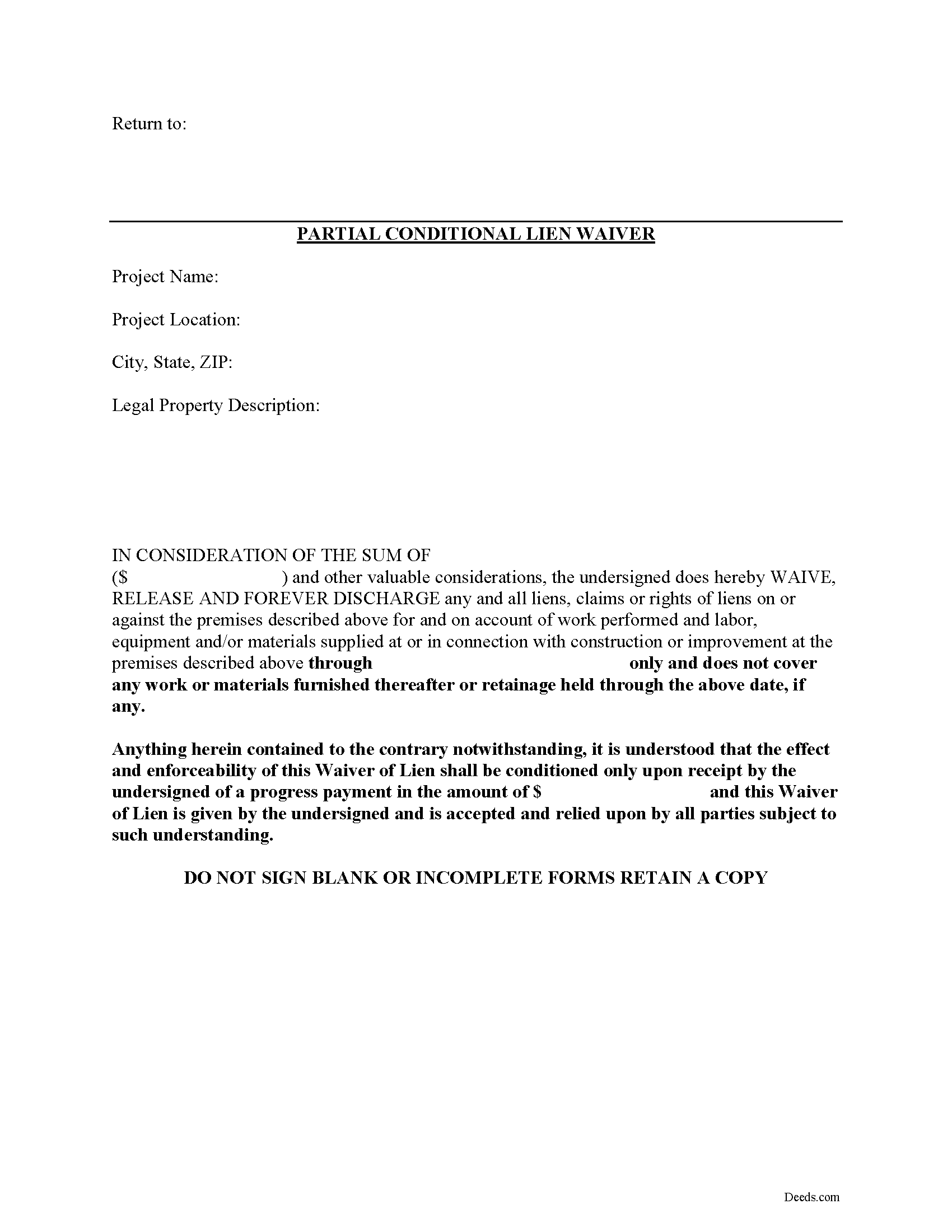
Mechanic's liens are governed under Chapter 376 of Kentucky Revised Statutes (K.R.S.). Although Kentucky law doesn't provide a required format for a waiver, claimants can use various types of lien waivers in order to simplify payments between contractors, subcontractors, customers, and property owners. A waiver is a knowing relinquishment of a right. In this case, the person granting the waiver is relinquishing the right to seek a mechanic's lien for all or part of the amount due. This assurance is usually enough to get the other party to pay.
Lien waivers are generally either based on a partial/progress payment or a final payment, and may be conditional or unconditional. Partial waivers release a portion of the lien rights, determined by the amount paid. Final waivers release all lien rights because the balance is paid in full. Conditional waivers give more protection to the claimant, and are dependent on any payments clearing the bank. Unconditional waivers give the advantage to the party responsible for paying, and take effect immediately upon recording, regardless of whether or not the bank covers the check.
Regardless of their nature, waivers must identify the parties, ... More Information about the Kentucky Partial Conditional Lien Waiver
Partial Unconditional Lien Waiver
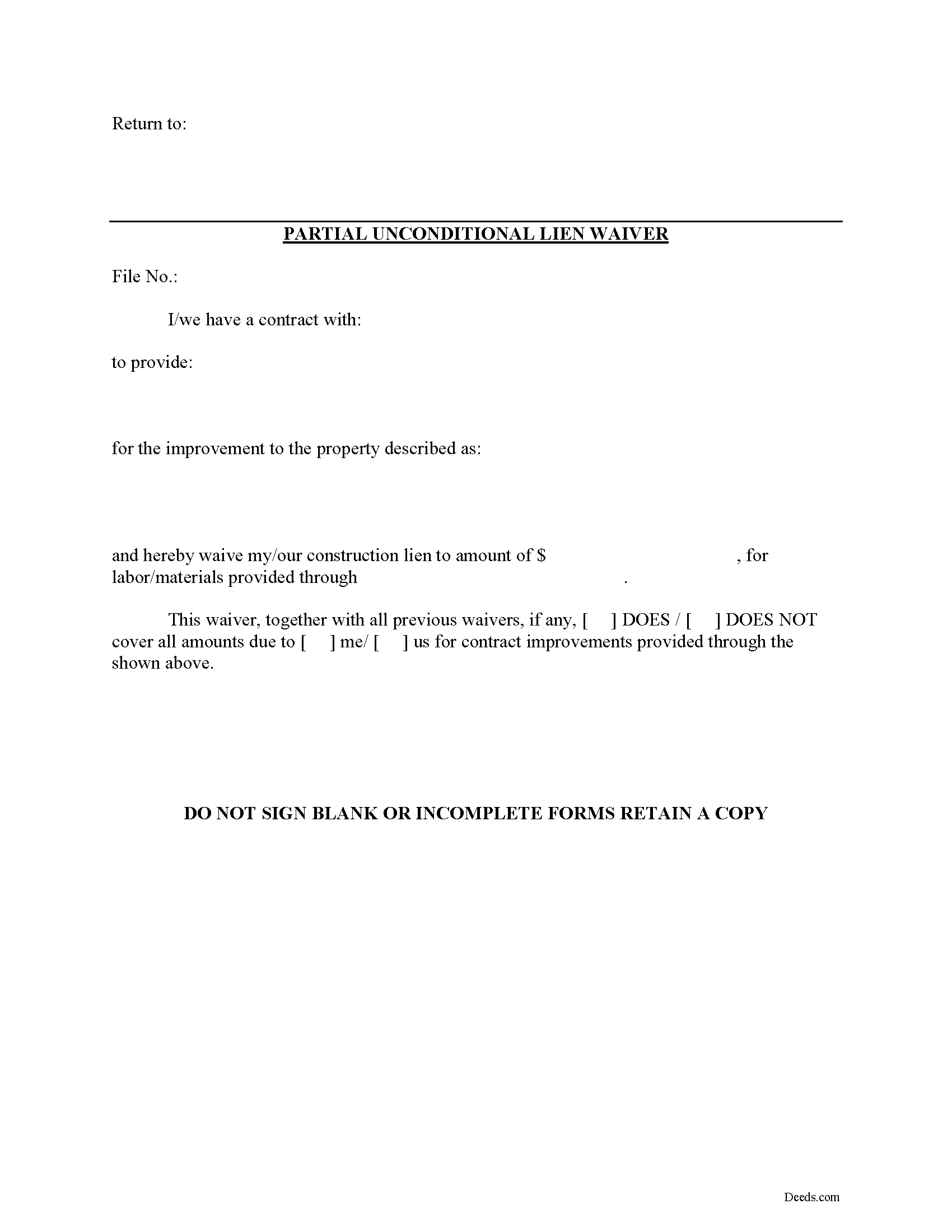
Mechanic's liens are governed under Chapter 376 of Kentucky Revised Statutes (K.R.S.). Although Kentucky law doesn't provide a required format for a waiver, claimants can use various types of lien waivers in order to simplify payments between contractors, subcontractors, customers, and property owners. A waiver is a knowing relinquishment of a right. In this case, the person granting the waiver is relinquishing the right to seek a mechanic's lien for all or part of the amount due. This assurance is usually enough to get the other party to pay.
Lien waivers are generally either based on a partial/progress payment or a final payment, and may be conditional or unconditional. Partial waivers release a portion of the lien rights, determined by the amount paid. Final waivers release all lien rights because the balance is paid in full. Conditional waivers give more protection to the claimant, and are dependent on any payments clearing the bank. Unconditional waivers give the advantage to the party responsible for paying, and take effect immediately upon recording, regardless of whether or not the bank covers the check.
Regardless of their nature, waivers must identify the parties, ... More Information about the Kentucky Partial Unconditional Lien Waiver
Final Conditional Lien Waiver
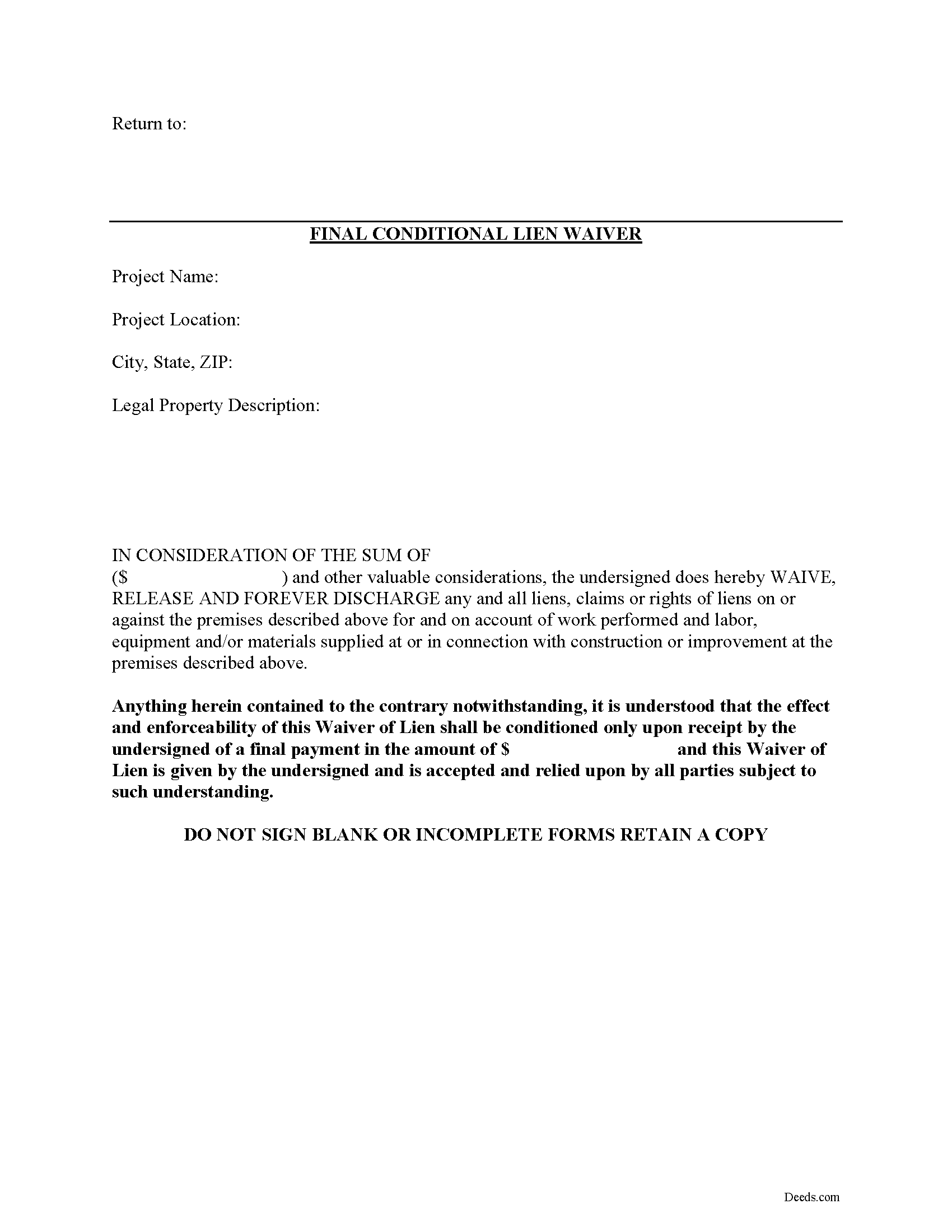
Mechanic's liens are governed under Chapter 376 of Kentucky Revised Statutes (K.R.S.). Although Kentucky law doesn't provide a required format for a waiver, claimants can use various types of lien waivers in order to simplify payments between contractors, subcontractors, customers, and property owners. A waiver is a knowing relinquishment of a right. In this case, the person granting the waiver is relinquishing the right to seek a mechanic's lien for all or part of the amount due. This assurance is usually enough to get the other party to pay.
Lien waivers are generally either based on a partial/progress payment or a final payment, and may be conditional or unconditional. Partial waivers release a portion of the lien rights, determined by the amount paid. Final waivers release all lien rights because the balance is paid in full. Conditional waivers give more protection to the claimant, and are dependent on any payments clearing the bank. Unconditional waivers give the advantage to the party responsible for paying, and take effect immediately upon recording, regardless of whether or not the bank covers the check.
Regardless of their nature, waivers must identify the parties, ... More Information about the Kentucky Final Conditional Lien Waiver
Final Unconditional Lien Waiver
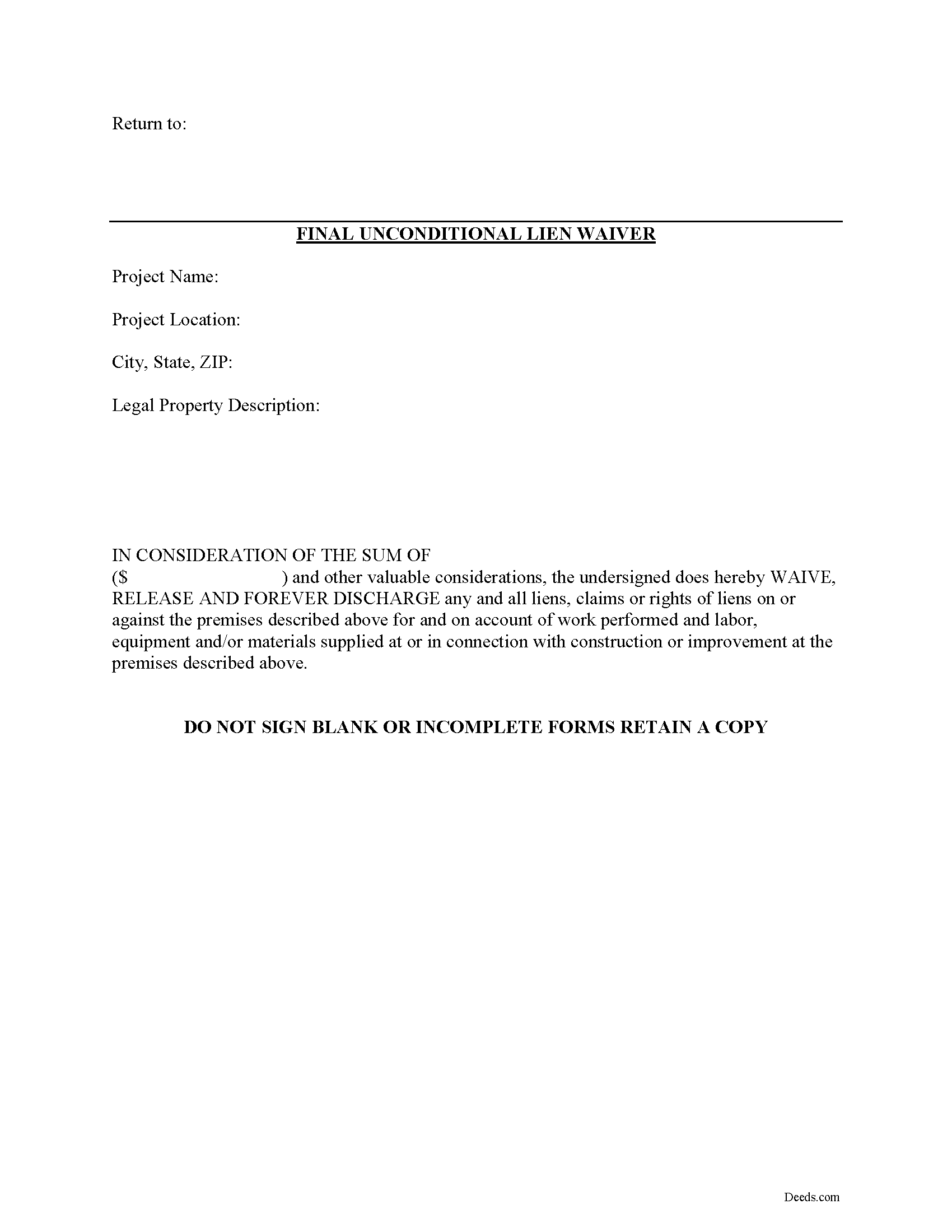
Mechanic's liens are governed under Chapter 376 of Kentucky Revised Statutes (K.R.S.). Although Kentucky law doesn't provide a required format for a waiver, claimants can use various types of lien waivers in order to simplify payments between contractors, subcontractors, customers, and property owners. A waiver is a knowing relinquishment of a right. In this case, the person granting the waiver is relinquishing the right to seek a mechanic's lien for all or part of the amount due. This assurance is usually enough to get the other party to pay.
Lien waivers are generally either based on a partial/progress payment or a final payment, and may be conditional or unconditional. Partial waivers release a portion of the lien rights, determined by the amount paid. Final waivers release all lien rights because the balance is paid in full. Conditional waivers give more protection to the claimant, and are dependent on any payments clearing the bank. Unconditional waivers give the advantage to the party responsible for paying, and take effect immediately upon recording, regardless of whether or not the bank covers the check.
Regardless of their nature, waivers must identify the parties, ... More Information about the Kentucky Final Unconditional Lien Waiver
Lis Pendens
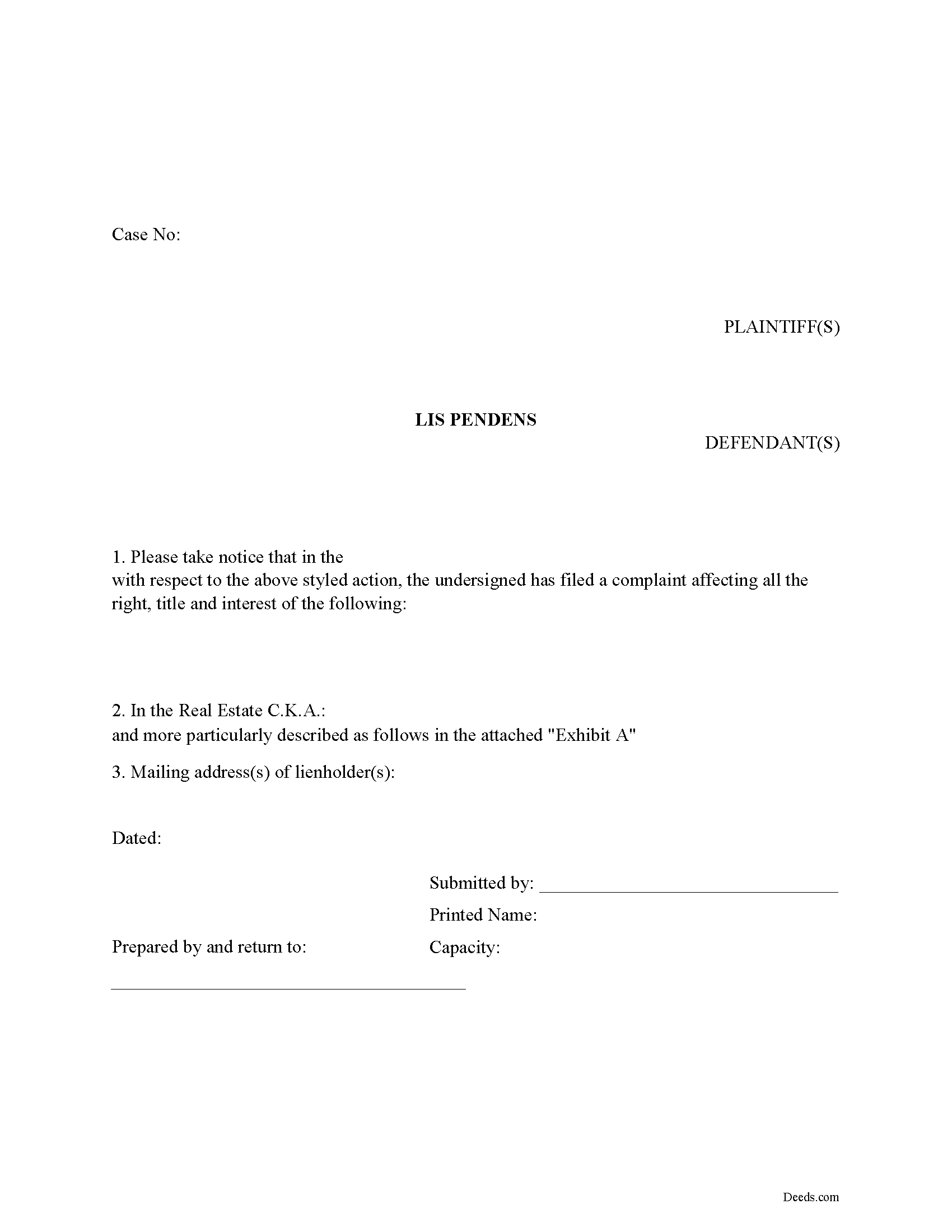
A Kentucky Lis Pendens becomes constructive notice when it is filed with the county recorder where the property is located (shall in any manner affect the right, title or interest of any subsequent purchaser, lessee, or encumbrancer of such real property, or interest for value and without notice thereof, except from the time there is filed, in the office of the county clerk of the county in which such real property or the greater part thereof lies, a memorandum stating (KRS 382.440(1)).
A separate Lis Pendens document should be filed in each county where the property is located. (Where the real property so affected consists of tracts lying in different counties, a separate notice shall be filed in each county as to the tract lying in that count KRS 382.440(3))
Contents of a Lis Pendens:
1. The Lis Pendens (style of action) contains the case number and court of pending case (The number of the action, if it is numbered, and the style of such action or proceeding and the court in which it is commenced, or is pending (KRS 382.440(1)(a))
2. Names of parties initiating the Lis Pendens (plaintiffs) (KRS 382.440 & 382.335)
3. Names of parties that claim is filed against (def... More Information about the Kentucky Lis Pendens
Lis Pendens Release
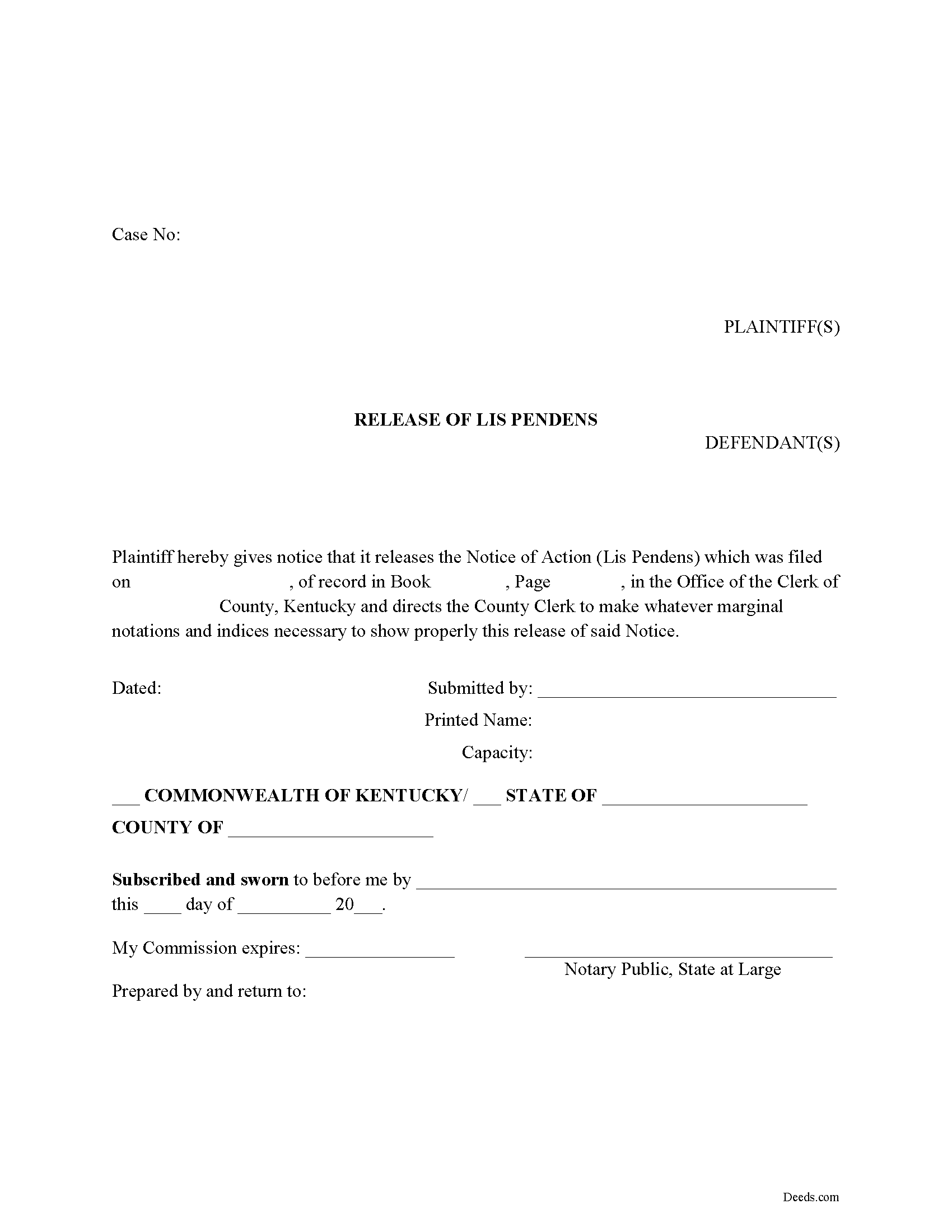
This Release of Lis Pendens is used by the plaintiff (party initiating litigation) or by the attorney of record in such action.
This Lis Pendens form follows these Kentucky statutes:
The name of the party(s) releasing the Lis Pendens (KRS 382.200)
The name of the party(s) being released (KRS 382.470 & 382.200)
The book and page reference of the original Lis Pendens that was filed (KRS 382.290 & 382.470)
Preparation Statement as per (KRS 382.335)
Return address for after recordation (KRS 382.240)
Notary statement for submitter (KRS 382.470).
(Kentucky Release Package includes form, guidelines, and completed example)... More Information about the Kentucky Lis Pendens Release
Disclaimer of Interest
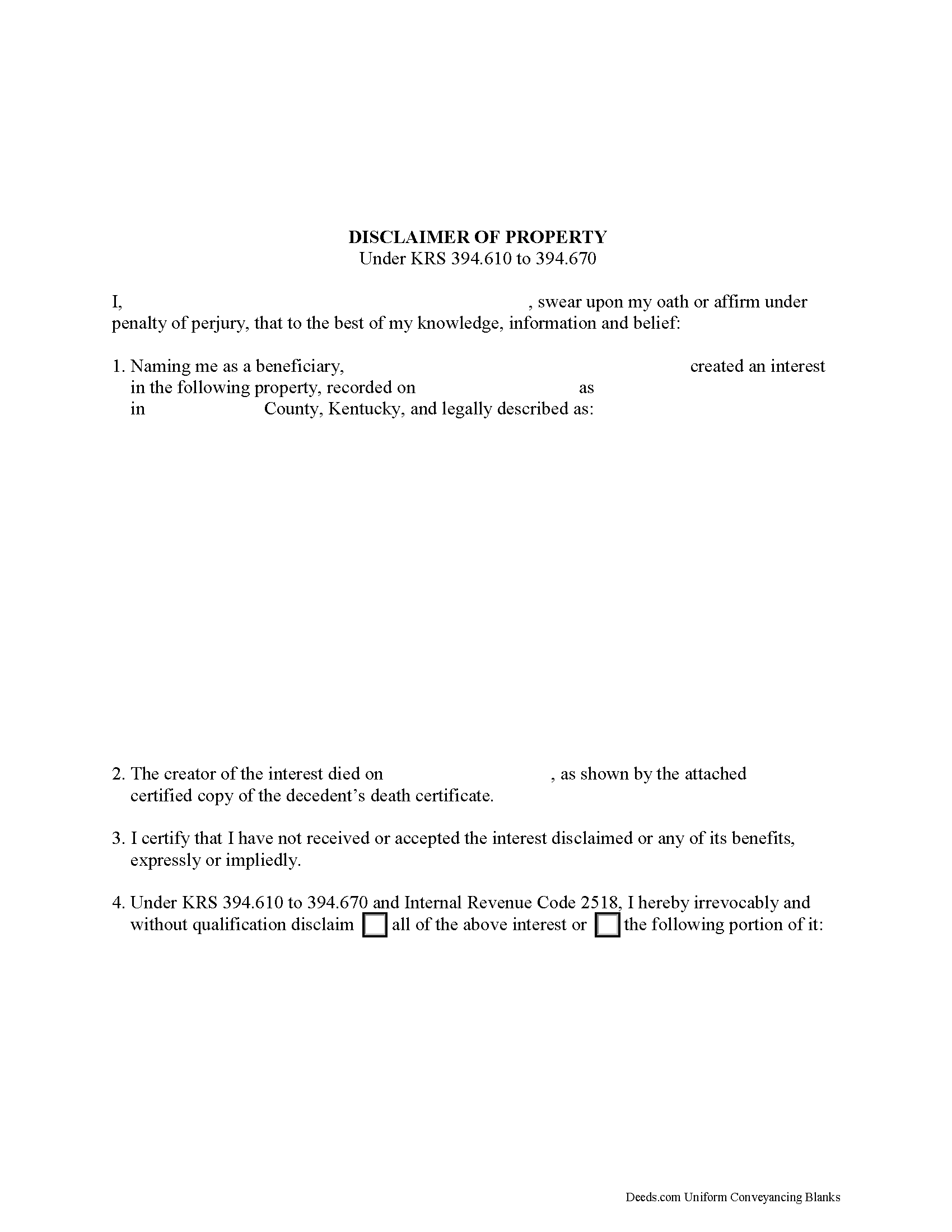
Under the Kentucky Revised Statutes, the beneficiary of an interest in property may renounce the gift, either in part or in full (KRS 394.610 to 670). Note that the option to disclaim is only available to beneficiaries who have not acted in any way to indicate acceptance or ownership of the interest (KRS 394.640)
The disclaimer must be in writing and include a description of the interest, a declaration of intent to disclaim all or a defined portion of the interest, and be signed by the disclaimant (KRS 394.610 (2)).
File the disclaimer within nine months of the transfer (e.g., the death of the creator of the interest) to the District Court of the county in which proceedings have been commenced, or could commence, for the administration of the estate of the deceased. Also, deliver a copy of the disclaimer to the personal representative or any other fiduciary of the decedent or donee. In the case of real property, record a copy of the disclaimer in the office of the county clerk of the county in which the real estate is located (KRS 394.620 (3)).
A disclaimer is irrevocable and binding for the disclaiming party and his or her creditors, so be sure to consult an attorney ... More Information about the Kentucky Disclaimer of Interest
Certificate of Trust
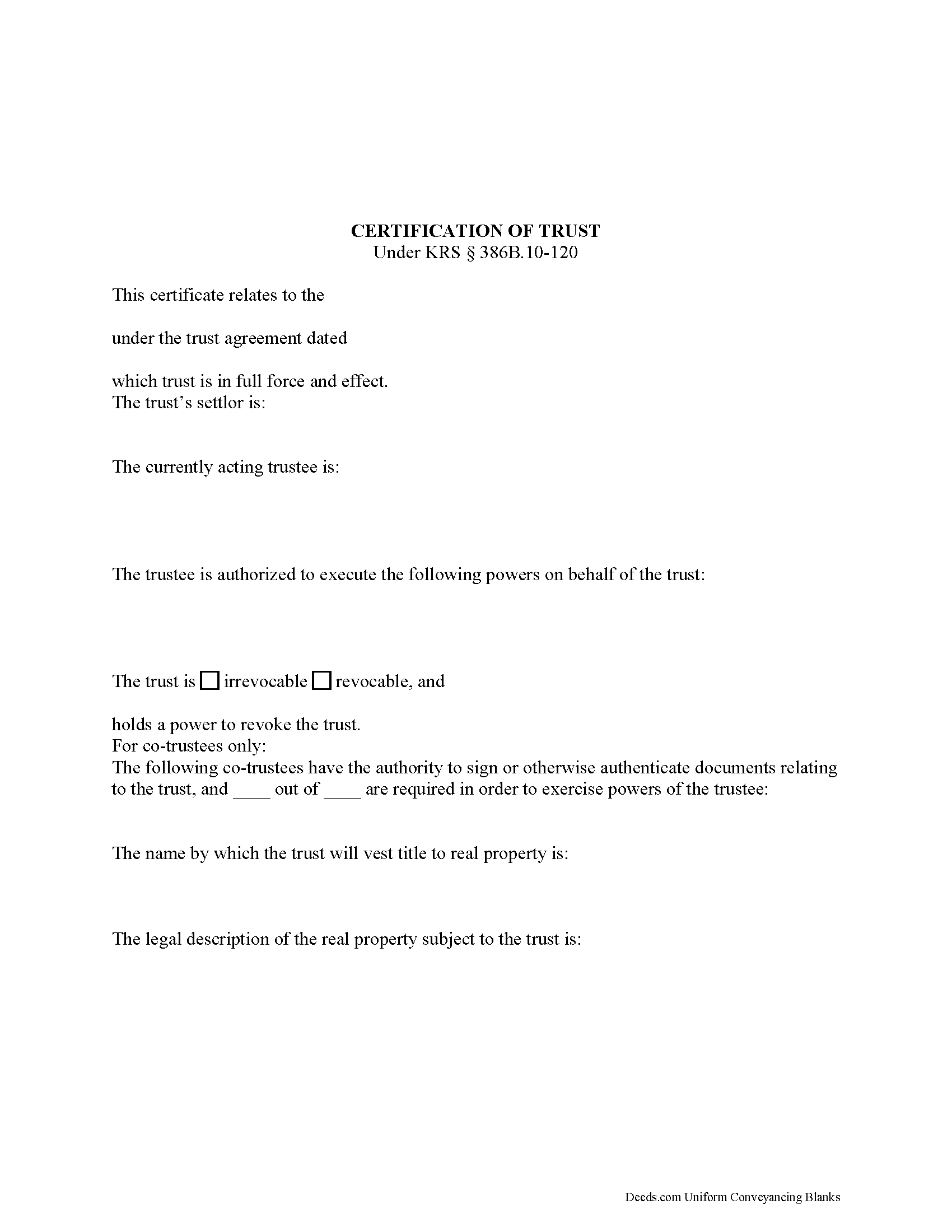
Codified under the Kentucky Uniform Trust Code at KSA 386B.10-120, the certification of trust is a document containing the relevant details of a trust and certifying a trustee's authority to act on behalf of a trust.
(Note: this certificate of trust is separate from the certificate of trust for business trusts under 386A.2-010 of the Kentucky Uniform Statutory Trust Act.)
A trustee can furnish the certification of trust instead of providing the entire trust instrument, as it "need not contain the dispositive terms of a trust" (KSA 386B.10-120(4)). In this way, the trustee can keep information irrelevant to the transaction, specifically the identities of trust beneficiaries, private.
A certificate of trust requires the name and date of the trust, along with the settlor's name. The settlor is the person who created the trust and is funding the trust with assets. In addition, the certificate identifies the currently acting trustee. The trustee is the fiduciary in charge of administering the trust.
In addition, the document details the powers of the trustee concerning the transaction at hand. For example, the certification of trust is commonly used in conjunction with a... More Information about the Kentucky Certificate of Trust
Contract for Deed and Promissory Note
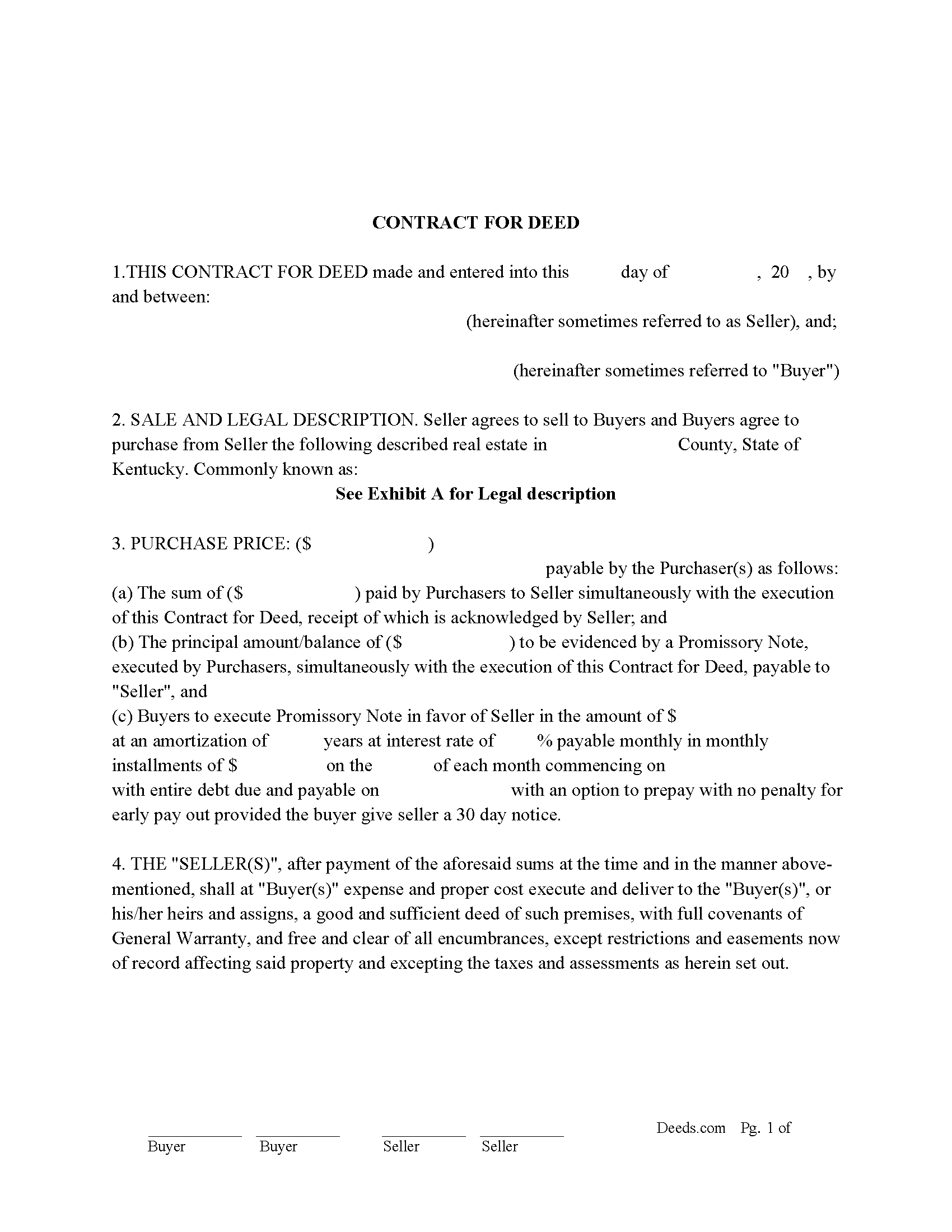
Contract for Deed also known as a Land Contract
Included are Three forms:
(1) "Contract for Deed" evidenced by a Promissory Note and
(2) "Promissory Note" secured by a Contract for Deed.
(3) "Annual Accounting Statement"
This is considered a more secure method of owner financing than just a land contract because the promissory note is more elaborate and defining of late payments, defaults and penalties. Typically, a Contract for Deed is a recorded instrument, as where the promissory note is held onto by the Seller/Lender until the note is paid in full. These forms are governed by Kentucky law. A promissory note with strong default terms can be beneficial to the seller/lender.
The Contract for Deed form states that the consideration reflected is the fair market value for the property. The parties join this Contract for Deed for the sole purpose of certifying the consideration pursuant to Kentucky Revised Statutes Chapter 382. These forms offer the choice of typical installment payments or a balloon payment, which is common in land contracts, $XXX down, payments for 3-5 years with balance due of YYY.
(Kentucky Contract for Deed Package includes form, guidelines, and com... More Information about the Kentucky Contract for Deed and Promissory Note
Memorandum of Contract
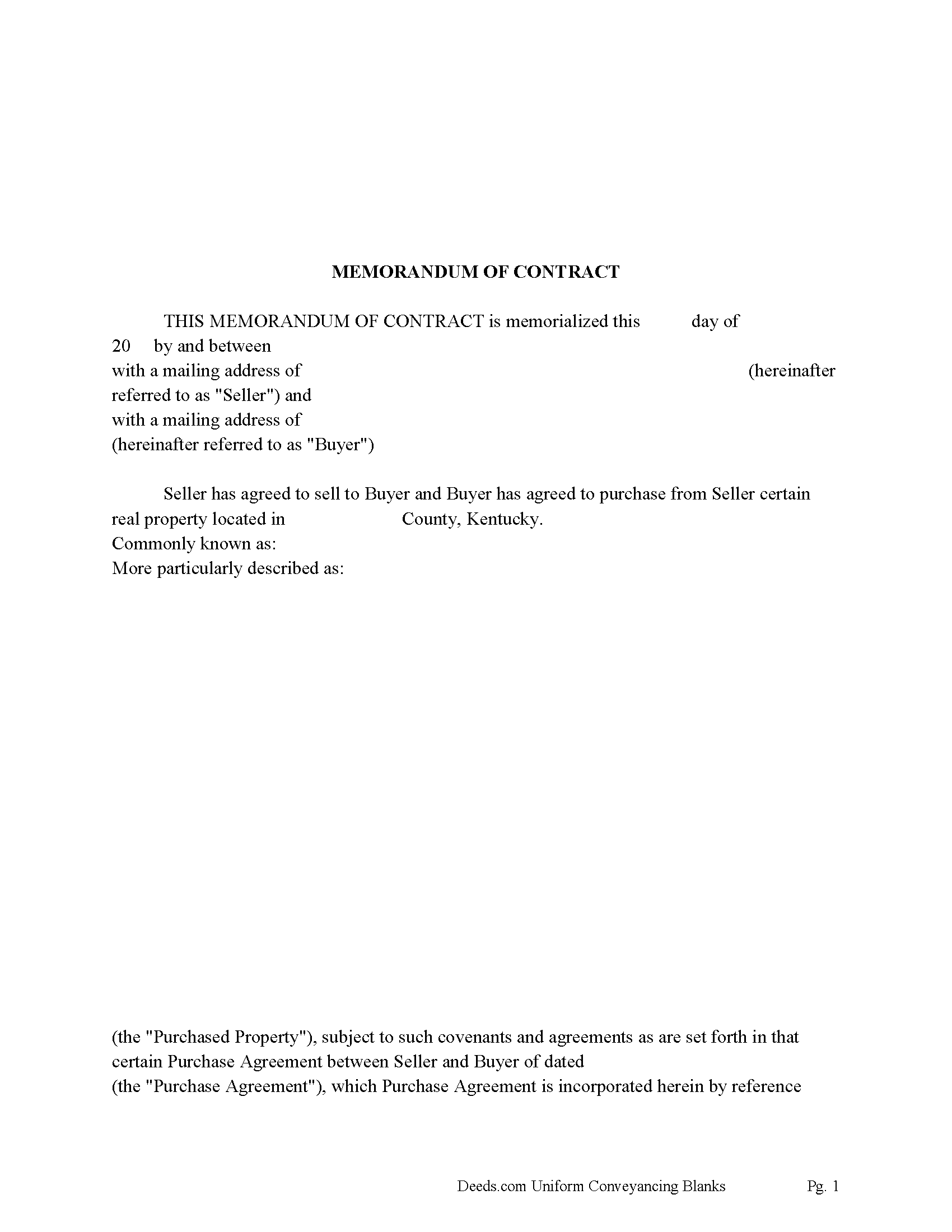
This form serves as notice that the Seller has agreed to sell, and Buyer has agreed to buy a specific property. Record this instrument when a Contract for Deed, Land Contract or Buy-Sell Purchase Agreement has been completed. This is done for a variety of reasons.
When parties want the details of a contract to be kept private.
When the Seller doesn't record the original Contract, very important for the Buyer to record a Memorandum of Contract. It serves as notice that the buyer is in fact purchasing the property, providing protection from further liens or encumbrances being placed on the property by the Seller. Memorandums are frequently recorded by buyers alone.
When owner financing is involved, and a buyer needs to finance property at a later point in time, a Lending Institution will most likely require a recorded Memorandum document. Further, banks like to see a history of payments, at least 12 months, often referred to as "Seasoning" a recorded Memorandum proves the subject property was under contract at a specific time.
(Kentucky Memorandum Package includes form, guidelines, and completed example) For use in Kentucky Only.
... More Information about the Kentucky Memorandum of Contract
Mortgage and Promissory Note
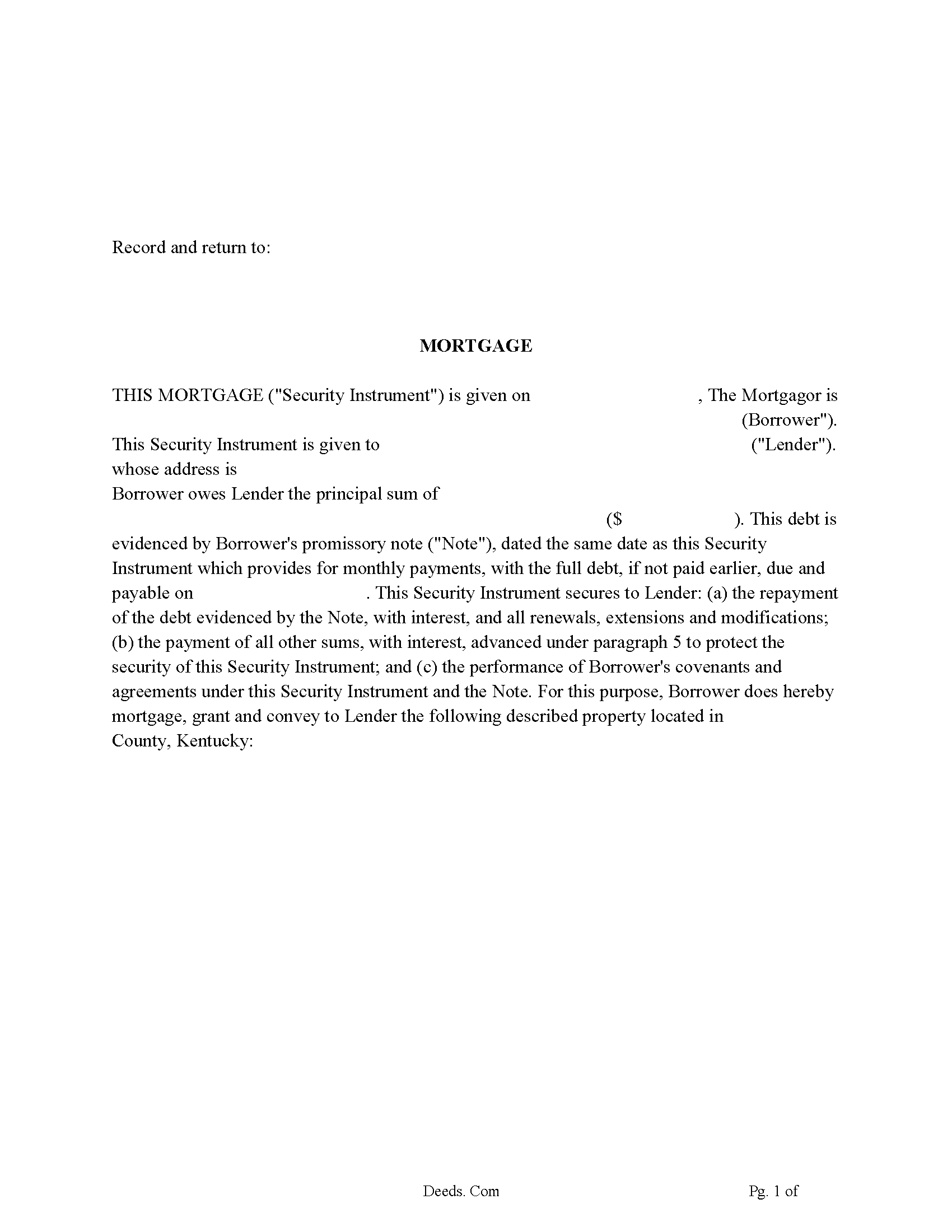
Kentucky Mortgage and Promissory Note
This is a Kentucky Mortgage given to secure a debt on real property. This form can be used to finance a house, rental property (up to 4 units) or Condominium. This form secures repayment of a debt, with interest. evidenced by a Promissory Note. A Mortgage with strong default clauses can be beneficial when selling and/or financing a property.
Mortgage Form that meets the following requirements.
MORTGAGE - This document must have the following: first party and their mailing address (KRS 382.335 & KRS 382.430), second party and their mailing address (KRS 382.110), amount of the mortgage (KRS 382.330), maturity date (KRS 382.330), legal description of the property (Common Law and OAG 81.100), preparation statement (KRS 382.335), and a return mail address (KRS 382.335 & KRS 382.240). The document must be signed by the mortgagor and notarized.
KRS 382.335
Provides that virtually all documents filed in land records contain the author's name, address and signature.
382.430 Instrument constituting lien to name person liable for taxes thereon.
(1) No mortgage, conveyance, or other instrument or writing constituting a lien or other securit... More Information about the Kentucky Mortgage and Promissory Note
Deed of Release for release of Mortgage
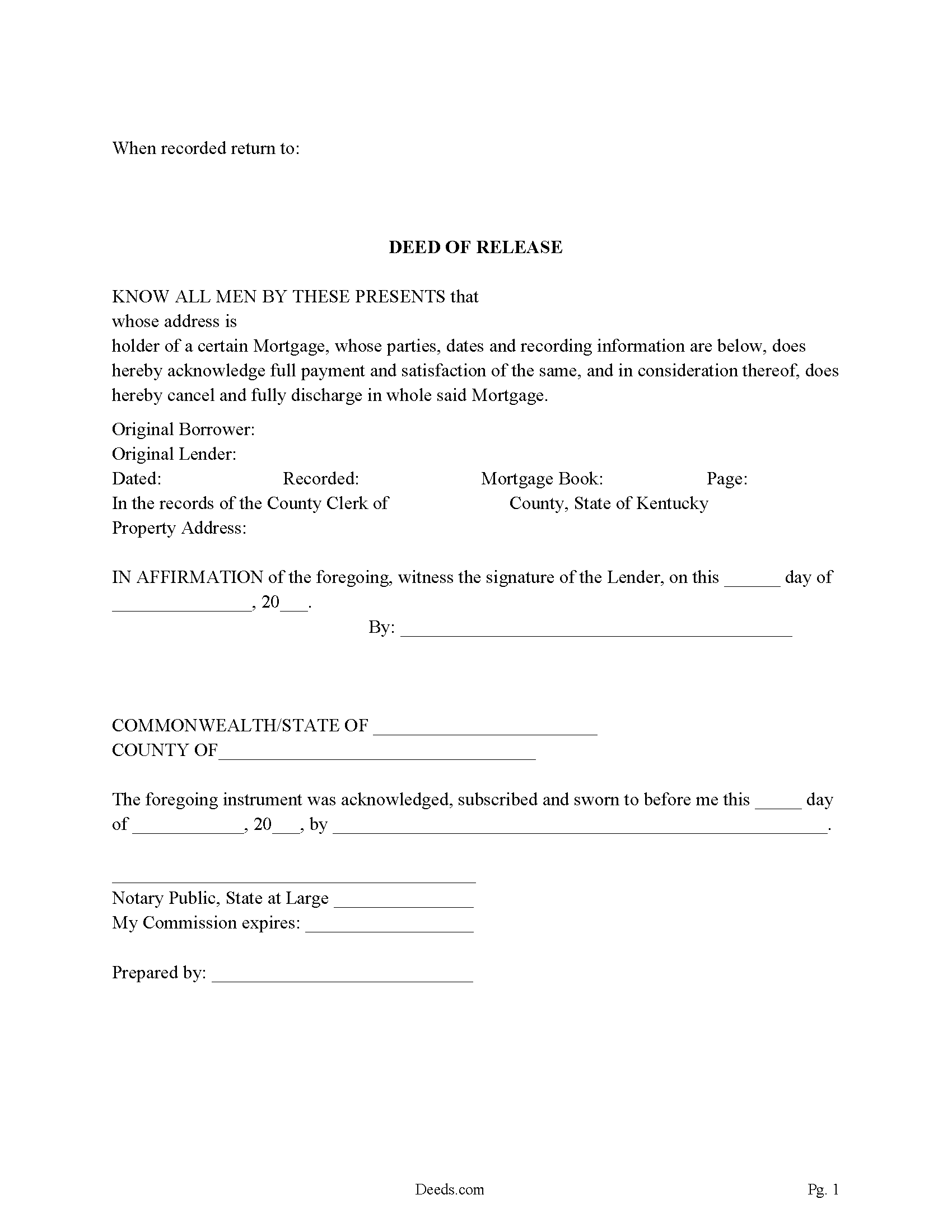
"Deed of Release" often known as a "Satisfaction of Mortgage" in other states, is used to cancel, release and discharge a mortgage instrument.
In this form the releasor acknowledges satisfaction and in consideration thereof, does hereby cancel and fully discharge in whole said Mortgage.
A deed of release is a recorded document that generally has to be filed within 30 days of mortgage satisfaction to avoid damages. This form (shall be executed as deeds are executed and shall be as effectual for the purposes therein expressed.) (KRS 382.020 Deeds of release.)
382.360 Discharge of liens by deed or mortgage -- Assignment of mortgage -- Effect. (Effective until January 1, 2020)
(1) Liens by deed or mortgage may be discharged by an entry acknowledging their satisfaction on the margin of the record thereof, or in the alternative, at the option of the county clerk, in a marginal entry record, signed by the person entitled thereto, or his or her personal representative or agent, and attested by the clerk, or may be discharged by a separate deed of release, which shall recite the date of the instrument and deed book and the page wherein it is recorded. Such release in the case of a m... More Information about the Kentucky Deed of Release for release of Mortgage